

Travel Guide
- Things to Do
- Best Hotels
- Things to See
- Best Restaurants
- Best Nightlife
- Getting Around
- City Layout
- Entry Requirements & Customs
- Sustainable Travel & Ecotourism
- Visitor Information
- Health & Safety
- Orientation
- Calendar of Events
- Tips for Families
- Getting There
- Tips for Gay and Lesbian Travelers
- Tips for Senior Travelers
- Tips for Travelers with Disabilities
- Tips for Travelers with Pets
- Tips for Women Travelers
- Staying Connected
- Organized Tours
- Active Pursuits
- Spectator Sports
- Suggested Itineraries
Entry Requirements & Customs in Las Vegas
Virtually every air traveler entering the U.S. is required to show a passport. All persons, including U.S. citizens, traveling by air between the United States and Canada, Mexico, Central and South America, the Caribbean, and Bermuda are required to present a valid passport. Note: U.S. and Canadian citizens entering the U.S. at land and sea ports of entry from within the Western Hemisphere must now also present a passport or other documents compliant with the Western Hemisphere Travel Initiative (WHTI; visit www.getyouhome.gov for details). Children 15 and under may continue entering with only a U.S. birth certificate, or other proof of U.S. citizenship.
Passport Offices --
- Australia -- Australian Passport Information Service (tel. 131-232, or visit www.passports.gov.au).
- Canada -- Passport Office, Department of Foreign Affairs and International Trade, Ottawa, ON K1A 0G3 (tel. 800/567-6868; www.ppt.gc.ca).
- Ireland -- Passport Office, Setanta Centre, Molesworth Street, Dublin 2 (tel. 01/671-1633; www.foreignaffairs.gov.ie).
- New Zealand -- Passports Office, Department of Internal Affairs, 47 Boulcott St., Wellington, 6011 (tel. 0800/225-050 in New Zealand or 04/474-8100; www.passports.govt.nz).
- United Kingdom -- Visit your nearest passport office, major post office, or travel agency or contact the Identity and Passport Service (IPS), 89 Eccleston Sq., London, SW1V 1PN (tel. 0300/222-0000; www.ips.gov.uk).
- United States -- To find your regional passport office, check the U.S. State Department website (travel.state.gov/passport) or call the National Passport Information Center (tel. 877/487-2778 ) for automated information.
The U.S. State Department has a Visa Waiver Program (VWP) allowing citizens of the following countries to enter the United States without a visa for stays of up to 90 days: Andorra, Australia, Austria, Belgium, Brunei, Czech Republic, Denmark, Estonia, Finland, France, Germany, Greece, Hungary, Iceland, Ireland, Italy, Japan, Latvia, Liechtenstein, Lithuania, Luxembourg, Malta, Monaco, the Netherlands, New Zealand, Norway, Portugal, San Marino, Singapore, Slovakia, Slovenia, South Korea, Spain, Sweden, Switzerland, and the United Kingdom. ( Note: This list was accurate at press time; for the most up-to-date list of countries in the VWP, consult http://travel.state.gov/visa.) Even though a visa isn't necessary, in an effort to help U.S. officials check travelers against terror watch lists before they arrive at U.S. borders, visitors from VWP countries must register online through the Electronic System for Travel Authorization (ESTA) before boarding a plane or a boat to the U.S. Travelers must complete an electronic application providing basic personal and travel eligibility information. The Department of Homeland Security recommends filling out the form at least 3 days before traveling. Authorizations will be valid for up to 2 years or until the traveler's passport expires, whichever comes first. Currently, there is a US$14 fee for the online application. Existing ESTA registrations remain valid through their expiration dates. Note: Any passport issued on or after October 26, 2006, by a VWP country must be an e-Passport for VWP travelers to be eligible to enter the U.S. without a visa. Citizens of these nations also need to present a round-trip air or cruise ticket upon arrival. E-Passports contain computer chips capable of storing biometric information, such as the required digital photograph of the holder. If your passport doesn't have this feature, you can still travel without a visa if the valid passport was issued before October 26, 2005, and includes a machine-readable zone; or if the valid passport was issued between October 26, 2005, and October 25, 2006, and includes a digital photograph. For more information, go to http://travel.state.gov/visa . Canadian citizens may enter the United States without visas, but will need to show passports and proof of residence.
Citizens of all other countries must have (1) a valid passport that expires at least 6 months later than the scheduled end of their visit to the U.S.; and (2) a tourist visa.
For information about U.S. Visas go to http://travel.state.gov and click on "Visas." Or go to one of the following websites:
Australian citizens can obtain up-to-date visa information from the U.S. Embassy Canberra, Moonah Place, Yarralumla, ACT 2600 (tel. 02/6214-5600 ) or by checking the U.S. Diplomatic Mission's website at http://canberra.usembassy.gov/visas.html .
British subjects can obtain up-to-date visa information by calling the U.S. Embassy Visa Information Line (tel. 09042-450-100 from within the U.K. at £1.20 per minute; or tel. 866/382-3589 from within the U.S. at a flat rate of $16 and is payable by credit card only) or by visiting the "Visas to the U.S." section of the American Embassy London's website at http://london.usembassy.gov/visas.html .
Irish citizens can obtain up-to-date visa information through the U.S. Embassy Dublin, 42 Elgin Rd., Ballsbridge, Dublin 4 (tel. 1580-47-8472 from within the Republic of Ireland at €2.40 per minute; http://dublin.usembassy.gov) .
Citizens of New Zealand can obtain up-to-date visa information by contacting the U.S. Embassy New Zealand, 29 Fitzherbert Terrace, Thorndon, Wellington (tel. 644/462-6000; http://newzealand.usembassy.gov ).
Every visitor 21 years of age or older may bring in, free of duty, the following: (1) 1 U.S. quart of alcohol; (2) 200 cigarettes, 50 cigars (but not from Cuba), or 3 pounds of smoking tobacco; and (3) $100 worth of gifts. These exemptions are offered to travelers who spend at least 72 hours in the United States and who have not claimed them within the preceding 6 months. It is forbidden to bring into the country almost any meat products (including canned, fresh, and dried meat products such as bouillon, soup mixes, and so forth). Generally, condiments, including vinegars, oils, pickled goods, spices, coffee, tea, and some cheeses and baked goods, are permitted. Avoid rice products, as rice can often harbor insects. Bringing fruits and vegetables is prohibited since they may harbor pests or disease. International visitors may carry in or out up to $10,000 in U.S. or foreign currency with no formalities; larger sums must be declared to U.S. Customs on entering or leaving, which includes filing form CM 4790. For details regarding U.S. Customs and Border Protection, consult your nearest U.S. embassy or consulate, or U.S. Customs (www.customs.gov).
For information on what you're allowed to take home, contact your home country's customs agency.
Medical Requirements
Unless you're arriving from an area known to be suffering from an epidemic (particularly cholera or yellow fever), inoculations or vaccinations are not required for entry into the United States.
Note : This information was accurate when it was published, but can change without notice. Please be sure to confirm all rates and details directly with the companies in question before planning your trip.

- All Regions
- Australia & South Pacific
- Caribbean & Atlantic
- Central & South America
- Middle East & Africa
- North America
- Washington, D.C.
- San Francisco
- New York City
- Los Angeles
- Arts & Culture
- Beach & Water Sports
- Local Experiences
- Food & Drink
- Outdoor & Adventure
- National Parks
- Winter Sports
- Travelers with Disabilities
- Family & Kids
- All Slideshows
- Hotel Deals
- Car Rentals
- Flight Alerts
- Credit Cards & Loyalty Points
- Cruise News
- Entry Requirements & Customs
- Car, Bus, Rail News
- Money & Fees
- Health, Insurance, Security
- Packing & Luggage
- -Arthur Frommer Online
- -Passportable
- Road Trip Guides
- Alaska Made Easy
- Great Vacation Ideas in the U.S.A.
- Best of the Caribbean
- Best of Mexico
- Cruise Inspiration
- Best Places to Go 2024
Everything you need to know about visiting Las Vegas right now

You’re ready for Las Vegas. But is Las Vegas ready for you? The short answer is: yes, mostly. Read on to get the details about what’s open, what’s different, and what you can expect out of a trip to Vegas.
Las Vegas is taking extraordinary measures to keep its visitors safe, but it can’t do it alone, so it’s asking visitors to mask, maintain distance whenever possible, and wash hands.
Since restrictions on dining, attractions, and gaming are evolving with the situation, it’s always a good idea to double check your destination before you go.
All information is current as of April 8, 2021.
Are Las Vegas casinos open?
Yes! Many Las Vegas casinos are open. Recent changes permitting more people to congregate have allowed many Las Vegas casinos to reopen, and more casinos are reopening every day. Some casinos have limited hours or may only be open on weekends, though this will likely change as demand returns. As of March 15, casinos are allowed to operate at 50% capacity. Precautionary measures are still in full effect: There’s a mask mandate in Nevada, so visitors are expected to wear masks in public spaces when not actively eating or drinking. And resorts are requiring social distancing, so maintaining space between yourself and those not in your traveling party remains important. Some casinos are introducing contactless betting options via app or kiosk. Before you go, check this list of open resorts or call the specific casino to check hours.
Are Las Vegas shows open?
Las Vegas shows are a huge draw, and some of the biggest shows on the Strip have resumed performances or announced reopening dates. Shows will be operating with limited capacity for the foreseeable future to accommodate social distancing, and masks for patrons are required. There are also mandatory distances in place between performers and guests, which primarily impacts shows in smaller venues and those with interactive elements. Of note, David Copperfield returned in late March; Penn and Teller will be returning on April 22; but the five Cirque du Soleil shows have yet to announce a reopening date. Given the restricted capacity, reserving seats may be more challenging, so book well in advance. Check the list of open shows to see what’s on.
What about pools? Are they open? And are pool parties happening?
More than two dozen of Las Vegas’ resort pools are open or will reopen soon. Many of the most popular pool parties will also reopen, with capacity restrictions and social distancing protocols in place. Resorts are recommending that pool guests make advance reservations due to capacity limits. Reserving lounge chairs, daybeds, and cabanas in advance is also recommended, and these offer a comfortable way to socially distance while enjoying the party atmosphere. This pool season, expect the return of amenities including DJs, bottle service, movies and televised sports, swim-up bars, and poolside dining. Contact the resort directly for details on hours and to book in advance.
Are Vegas restaurants and bars open? Do they have reduced capacity?
Many Las Vegas restaurants and bars have reopened at limited capacity. Current rules for indoor dining include limits of six people at each table for table service or two people per party at bar tops. There are no occupancy limits for outdoor dining (open or covered areas with no walls) except to accommodate social distancing requirements. Masks are required except when actively eating or drinking. Given the reduced capacity, it’s important to make reservations wherever possible. Check the regularly updated list of open restaurants and bars or contact the establishment directly for opening information and reservations.
I’m staying in a resort. Will the buffet be open?
Buffets have long been not just a Las Vegas staple, but one of the best deals in town. However, for now, nearly all buffets remain closed. The two buffets that have reopened are the Garden Buffet at South Point and the Wicked Spoon at The Cosmopolitan.
The Garden Buffet at South Point, about eight miles from the Strip, is serving breakfast, prime rib and champagne brunch, lunch, and dinner, including prime rib and seafood dinners. The Wicked Spoon at The Cosmopolitan, right on the Strip, is open for breakfast and lunch from Thursday through Sunday. Reservations are strongly encouraged, and dining times are limited to two hours per party. The open buffets require everyone to be masked except when sitting and eating. There’s abundant plexiglass and items are served to diners to limit touched surfaces and shared serving utensils.
Do I have to quarantine if I fly into Las Vegas?
You do not have to quarantine if you fly into Las Vegas. There are no current travel restrictions on domestic travel within the United States. The Centers for Disease Control and Prevention (CDC) requires all air passengers entering the United States from abroad to present a negative COVID-19 test. If you have tested positive for COVID-19 and have not yet recovered, have been presumptively diagnosed, or are exhibiting COVID-19 symptoms, you should not travel. If you are in Las Vegas and start to exhibit COVID-19 symptoms, you should quarantine yourself, avoid contact with others, and consult a health-care provider. For more on U.S. travel guidelines and rules, consult this article .
Nevada has a mask mandate, which means you must wear a mask while in public spaces, for both indoor and outdoor activities.
Does Vegas have a curfew in effect?
Las Vegas does not have a curfew law in effect for adults. There is, however, a longstanding curfew law for minors without adult supervision. Though there is no curfew in place in Las Vegas, nightclubs, karaoke bars, and adult entertainment establishments will remain closed until at least May 1.
Are taxis, Lyft, and Uber operating in Vegas?
Taxis and rideshare services like Lyft and Uber are operating in Las Vegas. However, recently visitors have reported reduced availability and longer wait times using rideshare apps.
When you’re waiting for and riding in taxis and rideshares, the State of Nevada requires that you remain masked.
More like this:
- Sin city still dazzles with entertainment and eats galore
- The ultimate side trip: Las Vegas to the Grand Canyon
- Las Vegas for kids: Tips for a great family vacation to Vegas
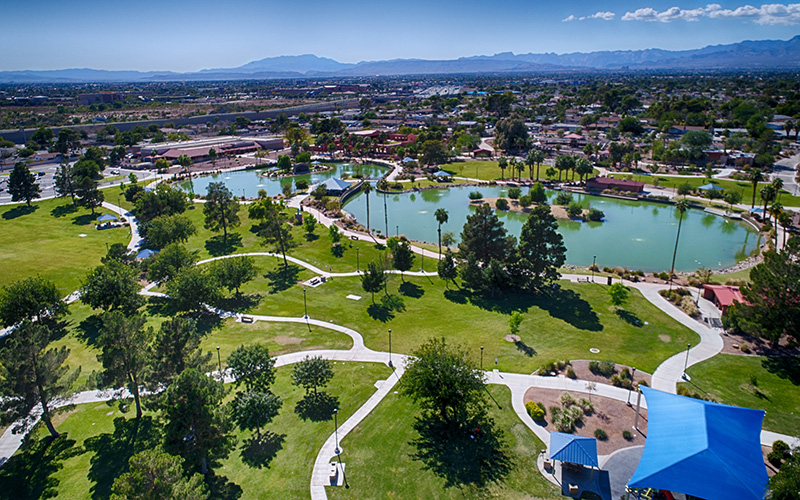
- Resident Services
- Parks & Facilities
- Activities and Classes
- Arts & Culture
- New Residents
- Permits & Licenses
- Parking & Transportation
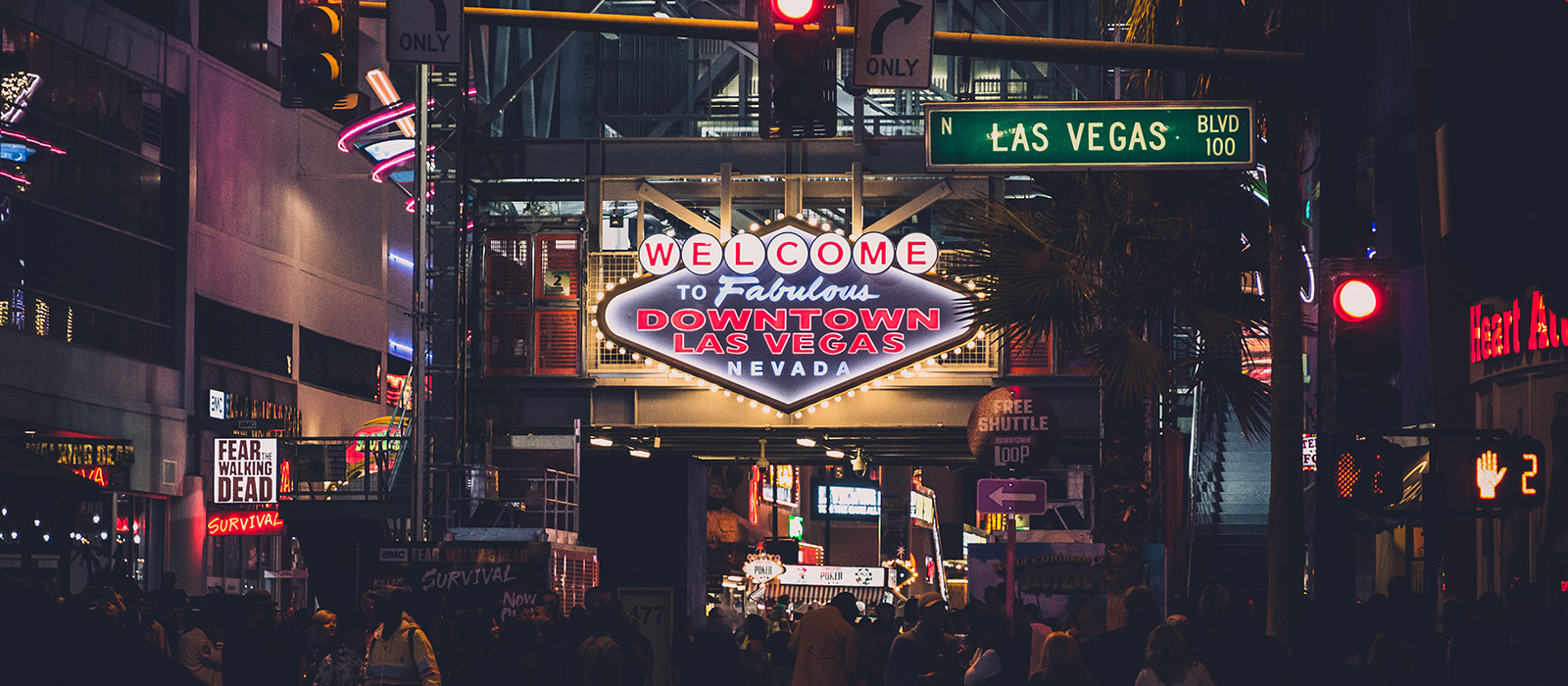
- Economic Development
- Business License
- Planning & Zoning
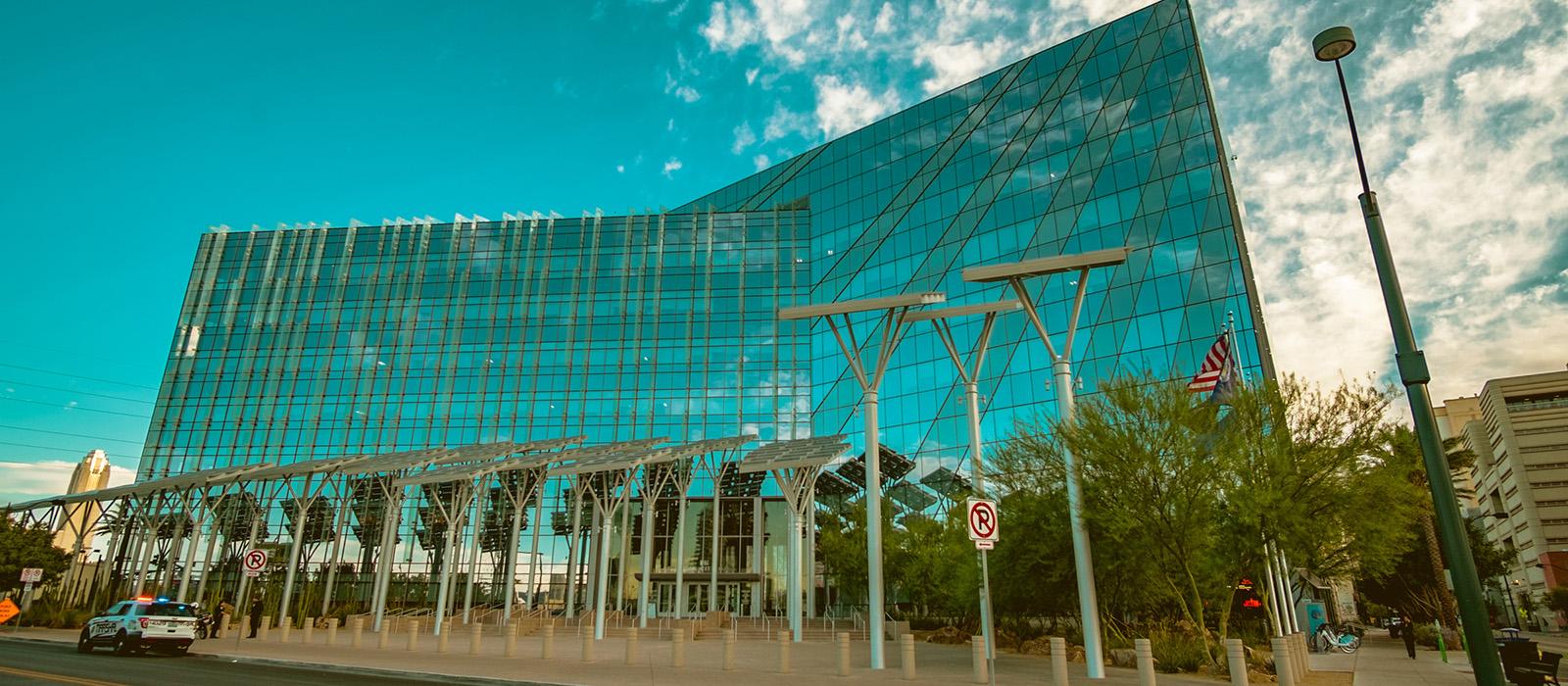
- Mayor & City Council
- Municipal Court
- Meetings & Agendas
- Initiatives
- Departments
- Transparency
- Public Safety Services
- Boards & Commissions
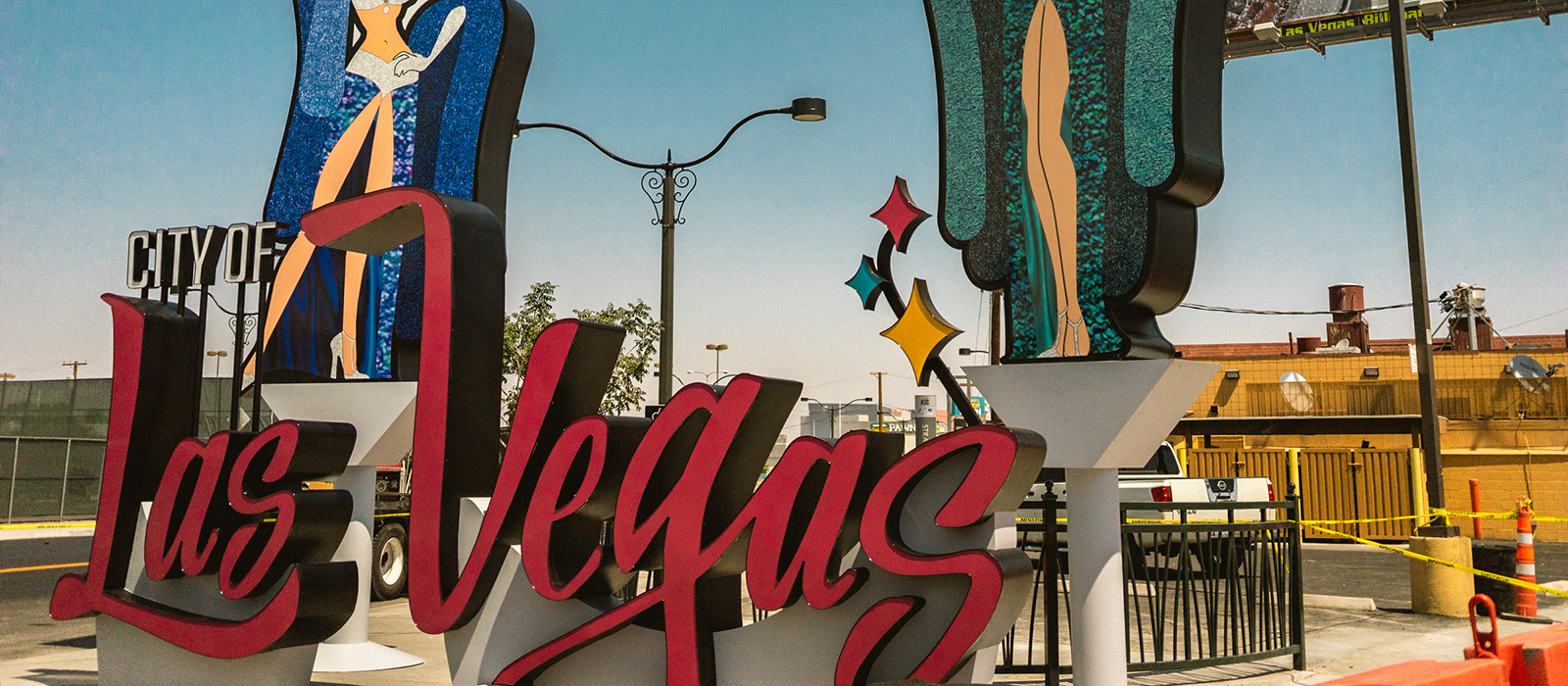
- News Releases
- Watch KCLV TV
- Vegas TMI Podcast
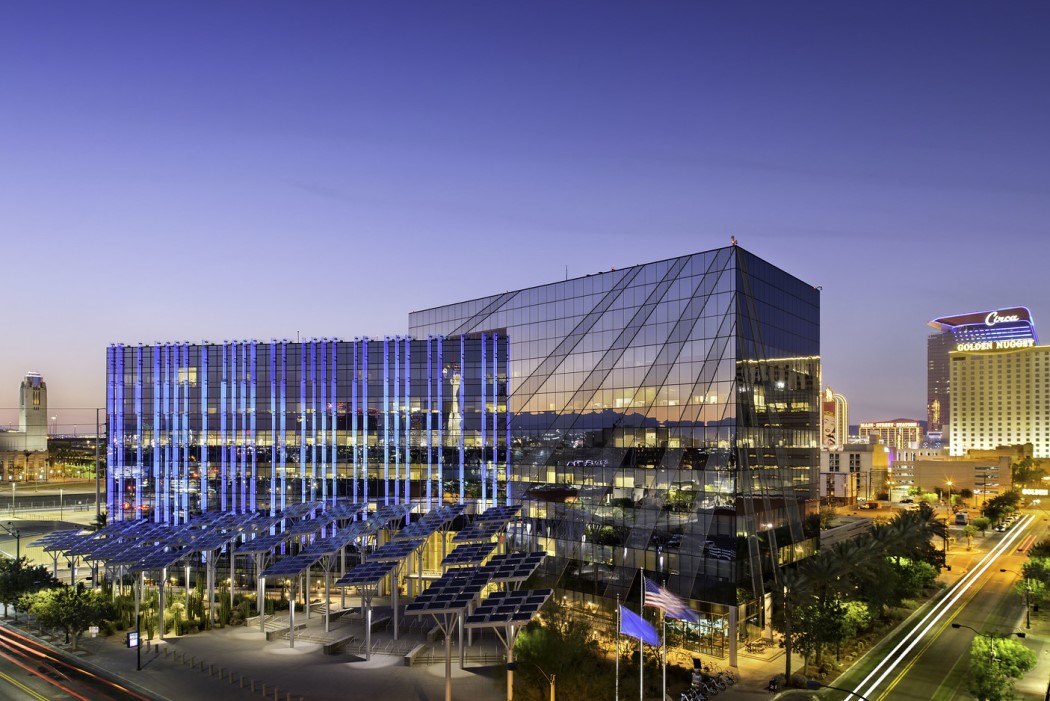
Quick Tasks & Search
Use this tool to quickly find a resource or task.
Top Requests
Coronavirus update.
The latest coronavirus information and resources.
- Latest Info
Vaccine Information
- Testing Sites
- Business Resources
- Ways to Help
- Homeless Community
Para obtener información sobre COVID-19 en español, visite este sitio web.
Latest Updates
Governor Sisolak Ends COVID-19 State of Emergency in Nevada
On Friday, May 20, 2022, the Declaration of Emergency related to the COVID-19 pandemic ended. The State of Emergency declaration had been in place since March 2020 and has allowed the state to respond to challenges brought forward by the unprecedented pandemic. Ending the State of Emergency ends certain flexibilities that were in place to help the state reaction to changing and unknown circumstances.
Mask Directive Rescinded
On Feb. 10, 2022, Governor Steve Sisolak lifted the mask mandate. While the state will no longer require masks in public places, there are locations where Nevadans and visitors may still be asked to wear a mask. E mployers and organizations, including school districts, may set their own policies.
View additional guidance.
Free At-Home COVID-19 Tests
Every home in the United States is eligible to order four (4) at-home COVID-19 tests. The tests are completely free. Order tests.
Learn more about the program through the United States government.
Additional Testing Available
More testing locations have been added and others have expanded their hours to help accommodate the increased need for testing as the positivity rate continues to increase. Visit SNHD's website to find a testing location .
If you are taking a rapid at home test, here are three things to keep in mind:
- It is best to use a rapid at-home test when you are experiencing symptoms.
- It is best to use a rapid at-home test one to five days after you develop symptoms.
- If your rapid test is negative but you are still experiencing symptoms, you will need to go get a PCR test.
CDC Updates and Shortens Recommended Isolation and Quarantine Period for General Population On Dec. 27, the CDC shortened the recommended time for isolation from 10 days for people with COVID-19 to 5 days, if asymptomatic, followed by 5 days of wearing a mask when around others. The change is motivated by science demonstrating that the majority of SARS-CoV-2 transmission occurs early in the course of illness, generally in the 1-2 days prior to onset of symptoms and the 2-3 days after. Therefore, people who test positive should isolate for 5 days and, if asymptomatic at that time, they may leave isolation if they can continue to mask for 5 days to minimize the risk of infecting others. Additionally, CDC is updating the recommended quarantine period for those exposed to COVID-19. For people who are unvaccinated or are more than six months out from their second mRNA dose (or more than 2 months after the J&J vaccine) and not yet boosted, CDC now recommends quarantine for 5 days followed by strict mask use for an additional 5 days. Alternatively, if a 5-day quarantine is not feasible, it is imperative that an exposed person wear a well-fitting mask at all times when around others for 10 days after exposure. Individuals who have received their booster shot do not need to quarantine following an exposure, but should wear a mask for 10 days after the exposure. For all those exposed, best practice would also include a test for SARS-CoV-2 at day 5 after exposure. If symptoms occur, individuals should immediately quarantine until a negative test confirms symptoms are not attributable to COVID-19. Read more about the changes.
The Health District is encouraging everyone to get vaccinated, and those who are not yet fully vaccinated to get their second doses as soon as possible. The vaccines are safe and highly effective at preventing hospitalization and death.
For more information on the vaccine and where to get a vaccine near you, visit our website .
All Nevadans aged 5 and older are eligible to schedule vaccination appointments statewide.
To schedule an appointment in Southern Nevada:
- Visit vax4nv.nv.gov/patient/s/
- Call 800-401-0946
Homebound vaccination appointments are also available. Call 855-635-0235 or email [email protected].
If you have questions about the vaccine, please visit https://www.immunizenevada.org/nv-covid-fighter for statewide information and https://covid.southernnevadahealthdistrict.org/vaccine/ for southern Nevada information. You can also call 800-401-0946.
Getting Tested
Statewide locations: https://nvhealthresponse.nv.gov/find-covid-19-testing-in-nevada/
Southern Nevada locations: http://covid.southernnevadahealthdistrict.org/testing/
Housing Assistance
The Nevada Attorney General’s Office has created a template Lease Addendum and Promissory Note to assist and encourage landlords to work with tenants on a repayment plan to keep people in their residences and to avoid overwhelming the courts. This voluntary document is intended to help landlords receive delinquent rental amounts while helping keep tenants in their homes or places of business under a payment plan for back due rents that they can afford.
Have You Been Exposed?
COVID-19 is a respiratory disease caused by a virus called SARS-CoV-2. The most common symptoms of the disease are fever, persistent cough and shortness of breath. Please click here if you think you have been exposed to or are developing potential symptoms.
Unemployment
The Nevada Department of Employment, Training and Rehabilitation (DETR), Employment Security Division encourages claimants to visit http://ui.nv.gov/css.html and detr.nv.gov/coronavirus to view important announcements and access essential resources.
To file for unemployment in the State of Nevada, please use the online application at http://ui.nv.gov/css.html . People unable to file online may file via telephone by calling a UI Claims Call Center between 8 a.m. and 8 p.m., Monday through Friday. Northern UI Call Center: 775-684-0350; Southern UI Call Center: 702-486-0350; Rural areas & Out-of-State: 888-890-8211.
You may refer to the resources listed on ui.nv.gov and frequently asked questions at https://detr.nv.gov/Page/COVID-19_(Coronavirus)_Information_for_Claimants_and_Employers .
Keeping The Homeless Safe
The city of Las Vegas is coordinating with Clark County and the Southern Nevada Health District to address health risks posed by the pandemic. Standard precautions already in place at the Courtyard Homeless Resource Center include frequent cleaning and disinfecting of surfaces, making hand-washing stations available and providing alcohol-based hand sanitizers. Anyone who needs help can visit lasvegasnevda.gov/homeless.
Is Our Water Safe?
COVID-19 is a respiratory illness, like the flu, which is spread person to person—there is no indication that transmission can occur via drinking water supplies.
Southern Nevada’s drinking water is treated using a combination of ozonation, filtration and chlorination, which are on the leading edge of water treatment processes and effective at removing contaminants from water. To ensure your water meets or surpasses drinking water standards, we also monitor water quality around the valley 24 hours a day, 365 days a year.
Rumor Control
For a full list from FEMA, visit https://www.fema.gov/coronavirus-rumor-control .
Is 5G Cell Phone Technology Linked To The Cause Of Coronavirus?
A worldwide online conspiracy theory has attempted to link 5G cell phone technology as being one of the causes of the coronavirus. Many cell towers outside of the U.S. have been set on fire as a result; 5G technology does NOT cause coronavirus.
I Got A Call, Text, Or Email Saying I Could Get Financial Help. Is It Legitimate?
There have been reports that scammers are pretending to be the government, contacting people by robocall, text message, email and other outreach. These scammers say they can get people financial help during the COVID-19 pandemic, and then ask for money or personal information, like your Social Security, bank account or credit card number. This is a SCAM.
Don’t trust anyone who offers financial help and then asks for money or personal information. Federal and local disaster workers do not solicit or accept money. The Department of Homeland Security, FEMA, U.S. Health and Human Services and the Centers for Disease Control staff never charge for disaster assistance. The Federal Trade Commission scams page has tips to help you avoid scams online, on the phone , by text and through email . If you see a scam, please report it to the Federal Trade Commission: ftc.gov/complaint.
Additional Resources
Follow the Health District on Twitter. Subscribe to their tweets by clicking on the bell on their profile here . Follow the Health District on Facebook .
Official information about travel and major events via the LVCVA
Official updates from CCSD
Official info from the CDC , o r subscribe to the weekly CDC newsletter .
If you have been victimized by any crime related to the COVID-19 pandemic, please report your experience to the Attorney General’s Office ( ag.nv.gov/Complaints/File_Complaint/ ) and the National Center for Disaster Fraud hotline at 1-866-720-5721 or by e-mailing [email protected] . In your email, please provide the following information:
- Your full name and contact information;
- The dates on which you were victimized;
- The location of the incident (including city and state);
- A brief description of the crime; and
- The name(s) and contact information of the perpetrator(s) (if known).
Connect with us
Subscribe and follow.
Sign up for the city newsletters and quickly get the latest information.
Las Vegas City Hall
Phone: (702) 229-6011
TTY 7-1-1 An All-America City

City Information

Las Vegas Direct
- Attractions

How to Stay Safe in Vegas During the COVID-19 Pandemic

Important Update: As of Feb 10th, 2022, masks are no longer required in Las Vegas. Las Vegas Governor Steve Sisolak removed the mandate because of a steep drop in Covid-19 cases. Several buffets are now open. Most shows and clubs are also open. However, a small number of shows and clubs may still require you to show proof of vaccination before being admitted. Almost all hotels have fully reopened. In general, Vegas is close to how it was before the pandemic started.
The requirement to wear masks in the airport or public transportation was also lifted. We still suggest wearing a mask, which is advised by the CDC when traveling. It may also be a good idea to wear one in crowded indoor places, especially if you are not fully vaccinated or at a higher risk of getting serious complications if infected. There are no restrictions on domestic travel to Vegas or Nevada, but testing and vaccination requirements may still apply for travel from certain countries.
A pandemic may have cancelled many things, but it hasn’t cancelled Las Vegas !
In short, you can still visit Las Vegas. You can still go out to eat and drink in Vegas. You can lounge by the pool and shop. And you can still gamble on that million-dollar jackpot!
Las Vegas has created a Vegas Smart plan that ensures everything is done to give visitors the best Vegas experience possible. We all know and love Las Vegas for being a place where anyone can have fun and escape reality for a bit! And while you can still do that, there are a few changes to the Las Vegas Strip that will make it that extra bit safer for us all to enjoy.
Here is everything you need to know about Vegas Smart.
The Four Golden Rules:
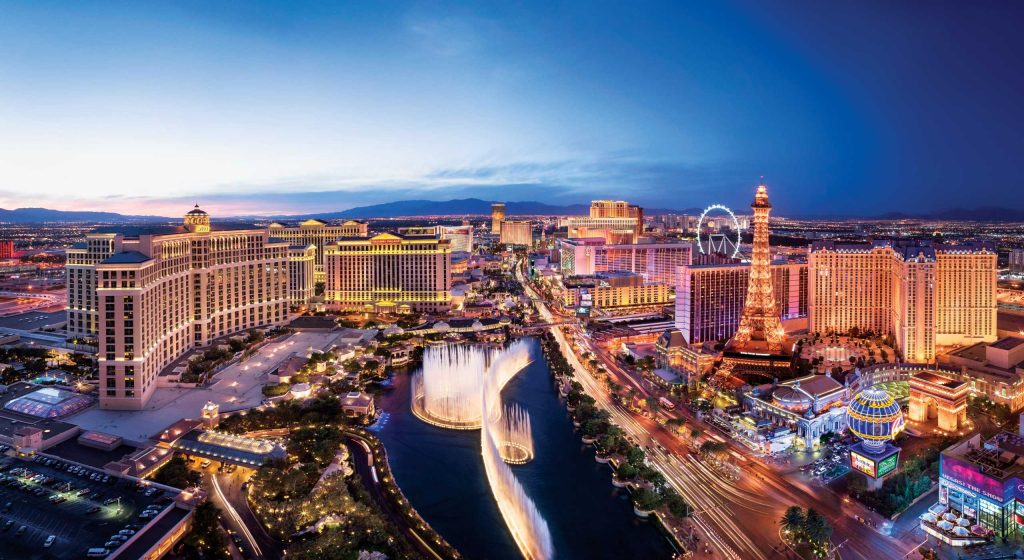
Las Vegas is asking all visitors to follow four simple golden rules during their time in Sin City.
1. Keep Your Distance
This means that you should try to keep some distance when practical, especially indoors. Meaning that you’ll get more of Vegas to enjoy all to yourself!
2.Wear a Mask
Masks are recommended and currently required in indoor public places when in Las Vegas. Why not go Vegas style with it and give it some glitz and glam? Some locations like airports and Ubers make them mandatory.
3. Wash Your Hands
There are more sanitizing stations throughout the Strip and there are plenty of bathrooms inside every hotel and casino to wash your hands at. Just do it!
4. Seek Medical Attention
As with any time you feel unwell, go see a doctor as soon as you experience any sort of symptoms of any sort. While it’s opposite to the classic Vegas motto, it is better safe than sorry in this current day in age.
What Will Be A Bit Different
While Las Vegas is ready to welcome you back, there are some things that will be a little bit different for the time being. Here is what you can expect.
- Clubs: Some clubs will be taking a short-term pause for the time being. But don’t worry, they are still planning on coming back when it is safe to do so! If you are really craving a party, hire out a penthouse suite at one of the hotels and invite your best mates to join you!
- Pools: Swimming pools are still open for you to cool off in, but don’t expect as many crazy pool parties for a while.
- Buffets: Don’t worry, you can still enjoy your crazy deals on the all-you-can-eat buffets . But the set up will look a bit different. For example, you may only get a menu on your mobile device and tables will be spaced more.
- Entertainment: In order to keep within the guidelines some of the showrooms have temporarily paused their entertainment. But the majority plan to be back when CDC guidelines indicate it is safe to do so! Some shows will require proof of vaccination. Many shows are now open .
- Gambling: you can still test your luck on the slot machine and card tables! Just expect the casino floors to look a bit different, with plexi-glass dividers between the slots and social distancing guidelines at the card tables
Where You Can Stay + Play
Las Vegas has plenty of hotels and casinos that are still open for you to enjoy! Every single resort in Las Vegas has put together its own wellbeing plan to keep everyone healthy and having a great time! Here are some key resorts who have come up with some epic plans to ensure each and every guest has the best time ever in Las Vegas—from social distancing guidelines to cleaning measures
1. Caesar’s Entertainment

This conglomerate of staple hotels in Las Vegas have developed extensive health and safety guidelines for their guests and staff. These hotels include Caesar’s Palace , Horseshoe Las Vegas , Flamingo Las Vegas , Harrah’s Las Vegas , Paris , The LINQ and Planet Hollywood . Here are the key things you can expect when you stay at one of these resorts:
- The resort is cleaned and disinfected daily during each shift.
- Casinos and restaurants are still open, there is just less capacity available to make social distancing a bit easier!
- There are hand-sanitizing stations throughout the resorts, including at check-in, at card tables and tellers.
- Your room won’t be entered while you’re in there and they will leave anything you’ve requested outside your door.
- Still get your sweat on at the fitness centers and keep you beauty appointments booked in as the salons and spas are still going.
2. MGM Grand International
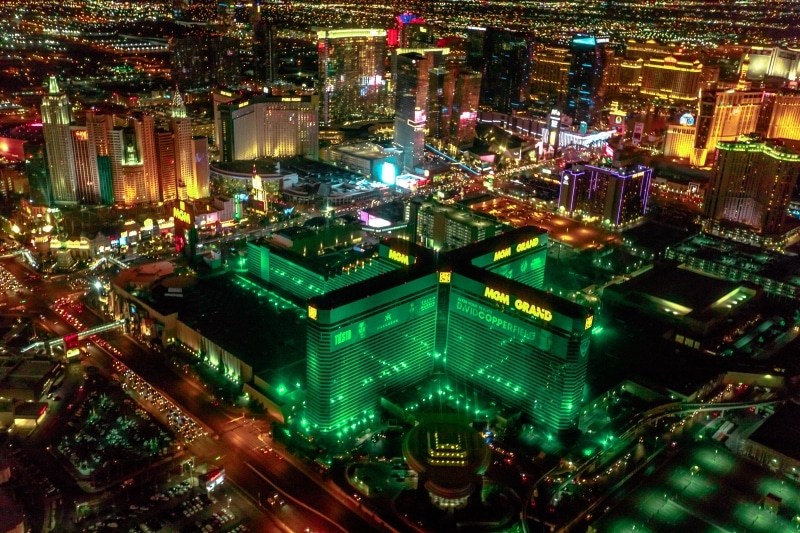
The hotels that are part of MGM have developed a seven-point safety plan that was done so with medical experts! It keeps both their team and you at the center of all things health and safety! Here’s what you can expect when you stay at the ARIA , Bellagio , MGM Grand , New York-New York , or The Mirage .
- Every employee at every resort gets a daily temperature check and has gone through a special Covid-19 health and safety training program. They also all have medical staff onboard to assist guests who do develop symptoms.
- Unlike the rest of the resorts on the Strip, those under the MGM Resorts umbrella don’t mandate masks for guests who are outside on their pool decks or inside the resorts. All employees will be wearing appropriate PPE at all times!
- There are floor markers throughout all of these resorts to help everyone ensure they are staying 6 feet apart. And the areas where that isn’t possible, there are additional preventative measure like plexiglass barriers.
- All hotels under MGM Resorts have built custom handwashing stations that are places strategically throughout each resort! Plus the cleaning staff have upped their shifts so everything in ever resort is getting cleaned all the time.
- These resorts have also enhances their air quality flow and added filters to all the guest rooms and throughout each building, making sure the air everyone breathes is clean and pure!
- MGM Resorts have also created a response protocol in the instance that someone does test positive on the property. There are medical staff and security personnel employed by each resort to be on standby for this scenario.
- To top it all off, these resorts have enhanced their digital innovations and completely reimagined the guest experience. Check-in is now able to be done by guests directly on their phone, making their room key contactless as well!
3. The Venetian Resorts

The Venetian and Palazzo Hotel & Casinos have developed their own Venetian Clean Commitment . It lays out their plans in accordance to working with the Southern Nevada Health District and the Centers for Disease Control. The commitment minimizes any risk for anyone—guest or employee—during their time in any of their hotels or casinos. Here are the key things you need to know.
- Cleaning is done on the regular to exceed CDC guidelines, meaning that everything is cleaned with disinfectants to kill the virus and there are hundreds of sanitization stations everywhere you go throughout.
- Guests are asked to wear their own face masks when visiting any of their hotels or casinos. But not to worry, as a guest at any of these hotels, you will get your own Venetian Clean amenity kit—which has face masks, hand sanitizer and sanitizing wipes.
- The air quality has been enhanced, as they use an air filter HVAC system which is hospital-grade air quality!
- The staff are all trained up with the program’s new clean training protocols and they provide testing for every single staff member!
But these aren’t the only hotels that have gone above and beyond to ensure you have the most epic time in Las Vegas! Rest assured that anywhere you go in Vegas, your health and safety has been considered and there is still plenty of fun Vegas activities to enjoy!

- 1-888-ME-VEGAS
- Chat / E-Mail Support
- Customer Support

REAL ID Act - Las Vegas Travel Requirements

Starting May 7, 2025, the REAL ID Act takes effect in the United States and requires all domestic U.S. travelers 18 years of age and older to possess a state-issued REAL ID-compliant license or identification card, enhanced driver’s license, or another acceptable form of ID (such as a passport), to fly on commercial aircraft within the United States.
Do you have a REAL ID?
Acceptable alternatives include U.S. passports, as well as Enhanced Driver's Licenses (EDLs) issued by Michigan, Minnesota, New York, Vermont and Washington.
Exceptions to thr REAL ID Act
Children under 18 will be exempt from this new requirement — if they're traveling with an adult who has acceptable identification.
Enhanced Driver's Licenses (EDL) issued by Washington, Michigan, Minnesota, New York, and Vermont are considered acceptable alternatives to REAL ID-compliant cards and will also be accepted for official REAL ID purposes.
How do I know if my license or identification card is REAL ID compliant?
REAL ID Act Requirements for Domestic Air Travel to Las Vegas
How do I get a REAL ID? As of March 26, 2021, 55 states and territories are fully compliant with the REAL ID requirements, and all states are on track to begin issuing compliant licenses and IDs by the May 7, 2025 deadline. Visit your State's driver's licensing agency website to find out exactly what documentation is required to obtain a REAL ID.
When does the REAL ID check go into effect? The final enforcement deadline is May 7, 2025. By this date, individuals planning to travel on any local US commercial airline must have visited their State's driver's licensing agency and obtained a REAL ID compliant ID card, or have on them an acceptable alternative such as a U.S. passport.
International Travelers to Las Vegas If you're traveling to Las Vegas from anywhere outside the United States, a REAL ID-compliant ID card is not required, but you will need a passport and depending on where you're coming from, you might need a visa also.
Estimated Flying Times to Las Vegas

WELCOME BACK
Las Vegas is open and ready to welcome you back to business, without restrictions involving capacity limits and large gatherings.
Effective Feb. 10, 2022, the State of Nevada has lifted mask mandates, including in resorts and casinos, restaurants, bars, showrooms and meeting spaces. Masks are still recommended for individuals who are not fully vaccinated, those with underlying health conditions and in healthcare facilities.
In November 2021, the United States lifted pandemic travel restrictions allowing fully vaccinated foreign nationals to travel to the country. For updates on international travel, visit CDC.gov , and the Airlines Travel Advisory for International Visitors .
Those planning to visit Las Vegas should regularly check this page as well as Nevada Health Response for updates on state and county requirement changes.
Visitors should check directly with resorts, attractions and other experiences for full details around operations. For health and wellness protocols regarding meetings and conventions, please contact show management or the venue or hotel property directly for more information.
Local and State Resources
- Nevada Health Response
- Southern Nevada Health District
- Harry Reid International Airport
- Nevada Resort Association
Federal Government Resources
- The U.S. Department of State
- U.S. Department of Labor
Tourism Industry Associations
- US Travel Association
- Professional Conference Management Association (PCMA)
- Meetings Professionals International (MPI)
- American Society of Association Executives (ASAE)
- Events Industry Council
- American Gaming Association
- Privacy Policy & Terms of Use
- VisitLasVegas.com
- VisitLaughlin.com
- VisitMesquite.com
- VisitBoulderCity.com
- VegasMeansBusiness.com

Back to top
- 1-866-983-4279
- RECENTLY SEEN
- MY ACCOUNT Welcome to Vegas.com! Sign in to see deals of up to 50% off. Sign in ×
- Attractions
Search Las Vegas Shows
Company information, travel notices, customer care, travel advisory.
At Vegas.com, we’re excited to welcome you back to Las Vegas and we want to do everything we can to assist you in having a great vacation. Here’s what we’re doing to help make it as stress-free as possible so you can book your Vegas vacation with confidence.
Keeping You in the Know: Our customer support team is working to provide the best service and support to each and every customer. While this is an evolving situation, please know the Vegas.com team is committed to adapting quickly and accordingly to changing plans as they unfold. For more information on reopening dates and enhanced safety measures, visit our Travel Guidelines page.
Cancellation Policy: Need a little more time before hitting the slots? We’ve got you covered. Our customers can cancel hotel bookings up to 48 hours before their reservation start date. Our customer support team can help cancel or rebook for a later date over phone or email. We make rebooking a breeze.
If you need to change your reservation, please email [email protected] with your request and be as detailed as possible, including your full name, reservation number, dates of travel and what the reservation is for.
Store Credit: If you need to rebook your visit and want to travel at a later date, you can take advantage of an accelerated rebooking process by receiving instant store credit, redeemable for any of our travel products (not just what your original reservation was for). Your store credit never expires and we can help you rebook when you are ready to do so.
Travel Insurance: For extra travel protection, we offer Allianz Travel Insurance for Air+Hotel package reservations. Covered trip cancellations, lost baggage and last-minute emergencies are protected, plus there is 24-hour live assistance and the convenient TravelSmart™ app to help you keep track of your travel plans and information. Please read Allianz Global Assistance's COVID-19 Coverage Alert for important information about insurance coverage and exclusions for losses resulting from COVID-19.
What do Nevada's new COVID-19 restrictions mean for Las Vegas? Here's what you need to know

LAS VEGAS – The surge of COVID-19 in Nevada is now at " wildfire levels ," and new statewide restrictions that started Tuesday will impact travelers visiting this gambling and entertainment destination.
"We are on a rapid trajectory that threatens to overwhelm our health care system, our frontline health workers, and your access to care," Nevada Gov. Steve Sisolak announced Sunday. "So it’s time to act."
What does the new "statewide pause" mean for vacationers visiting The Strip? The Reno Gazette Journal , which is part of the USA TODAY Network, put together a guide for what travelers need to know about the new restrictions.
When do the new Nevada COVID-19 restrictions start?
They started at 12:01 a.m. Tuesday.
How long will they last?
The will be in place for three weeks, according to Sisolak.
Will they impact my plans at Las Vegas hotels and casinos?
They could. The biggest change tourists will experience inside resorts is a limit on the number of people allowed inside. The following places must reduce their capacity to 25%:
- Art galleries
- Racetracks
- Bowling alleys
- Amusement and theme parks
How will the restrictions be enforced at resorts?
The state is in constant contact with the Nevada Gaming Control Board, Sisolak said.
"I had conversations with most of our gaming operators in the past 24 hours," Sisolak said. "I can assure you that the full force of the Nevada Gaming Control Board will be behind the implementation and the enforcement of these 25% requirements, and if they don't follow them, they will suffer the consequences as delineated by the gaming control board."
Those capacity restrictions also apply to restaurants and bars.
Can I still walk into a Nevada restaurant?
Not without a reservation.
The statewide pause will affect all restaurants, fast food places and bars that serve food in the following ways:
- Reservations are now required.
- Capacity will be reduced from 50% to 25%.
- No more than four customers can be at a table.
"I know the majority of our bars and restaurants are doing their best, but these settings are proven to be high risk because they allow the opportunity for people to remove their face coverings in indoor settings around people outside of their household," Sisolak said. "That’s how the virus spreads."
Are there limitations on private gatherings, including Thanksgiving?
Starting Tuesday, the following will apply to private gatherings – likely cutting into many Thanksgiving dinner party plans:
- No more than 10 people can attend.
- No more than two households can participate.
What about public gatherings?
The following limits will be in place for public gatherings:
- Capacity must be reduced from 250 to 50 people, or 25% of fire code capacity, whichever is smaller. That includes at churches.
Are there any changes to the mask mandate?
Yes, the mandate has been expanded.
Masks are required at any time you are around someone not part of your immediate household, including during private gatherings inside and outside.
What isn't affected by the new restrictions?
The three-week restrictions do not apply or change Nevada's current health and safety protocols, such as capacity limitations for:
- K-12 schools
- Community and recreation centers
- Retail stores
- Barbershops
- Hair and nail salons
- Body art or piercing establishments
- Massage and spa establishments
- Medicinal or recreational cannabis dispensaries
Contributing: Joe Jacquez, Reno Gazette Journal.
Ed Komenda writes about Las Vegas for the Reno Gazette Journal and USA Today Network.

- Entertainment
- Investigations
- Latest Headlines
- Law Office Shooting
- What Are They Hiding?
- 2024 Election
- Clark County
- Nation and World
- Science and Technology
- Road Warrior
- Las Vegas Weather
- East Valley
- North Las Vegas
- Summerlin/Centennial Hills
- Remembering Oct. 1, 2017
- Deborah Wall
- Natalie Burt
- Remembering Jeff German
- Police Accountability
- Alpine Fire
- 100 Years of Growth
- Dangerous Driving
- Raiders News
- Golden Knights
- UNLV Football
- UNLV Basketball
- Nevada Preps
- Sports Betting 101
- Las Vegas Sportsbooks
- National Finals Rodeo
- Where Are They Now?
- On TV/Radio
- MMA and UFC
- Casinos & Gaming
- Conventions
- Inside Gaming
- Entrepreneurs
- Real Estate News
- Business Press
- Sheldon Adelson (1933-2021)
- Debra J. Saunders
- Michael Ramirez cartoons
- Victor Joecks
- Richard A. Epstein
- Victor Davis Hanson
- Drawing Board
- Homicide Tracker
- Faces of Death Row
- Kats’ Cool Hangs
- Arts & Culture
- Home and Garden
- Las Vegas Hiking Guide
- RJ Magazine
- Today’s Obituaries
- Submit an obit
- Dealer News
- Classifieds
- Place a Classified Ad
- Provided Content
- Real Estate Millions
- Internships
- Service Directory
- Transportation
- Merchandise
- Legal Information
- Real Estate Classifieds
- Garage Sales
- Contests and Promotions
- Best of Las Vegas
- Nevada State Bank
- Verizon Business
- P3 Health Partners
- Adult Health
- Star Nursery
- Partner Articles
- Ignite Funding
- Supplements
- Travel Nevada
- Subscriptions
- Newsletters
- Advertise with Us
- >> Business
- >> Tourism
New US travel guidelines could boost Las Vegas tourism
New U.S. guidance on travel could drive more tourism to destinations like Las Vegas, experts say.
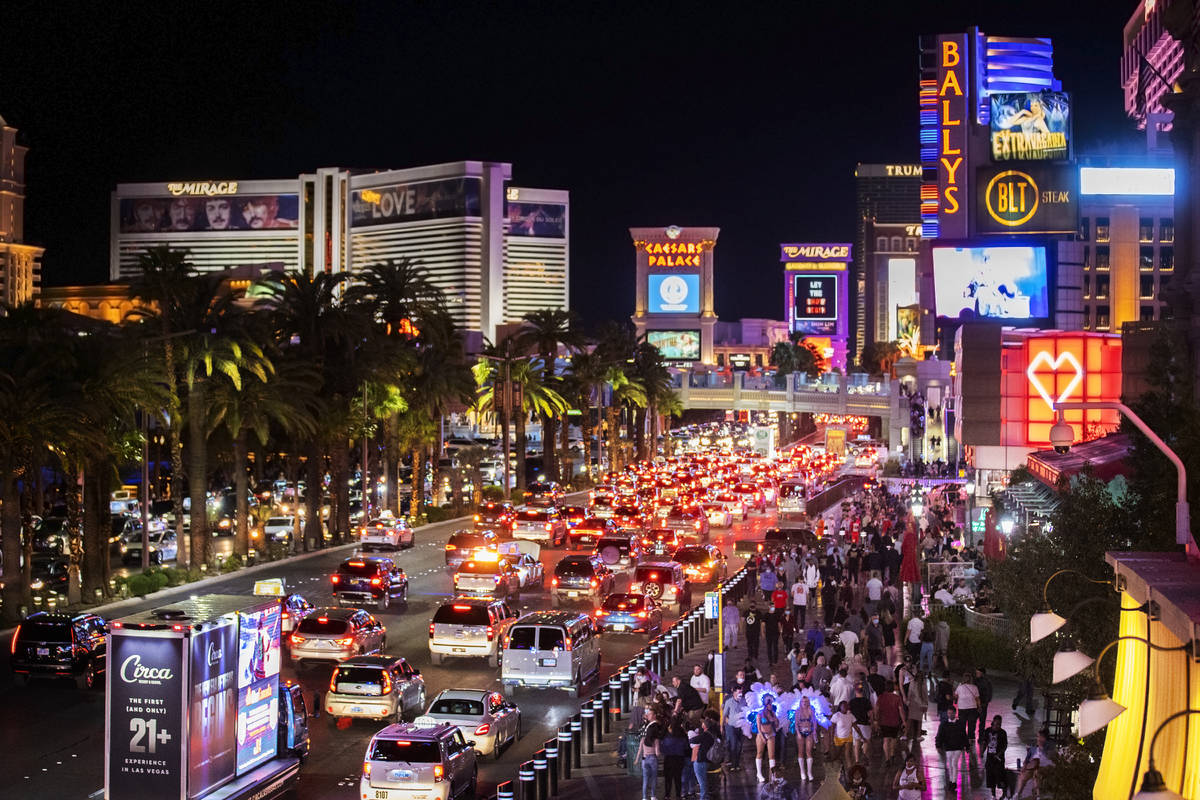
The Centers for Disease Control and Prevention updated its travel guidance on Friday to say that people fully vaccinated against COVID-19 can travel, provided that they continue to wear masks and social distance. The agency had previously asked that all Americans avoid unnecessary air travel.
“This definitely, at least domestically, helps open up travel a little bit more and should be good for the destination,” said gaming consultant Brendan Bussmann of Global Market Advisors.
For people who haven’t been fully vaccinated, the CDC is sticking to its recommendation to avoid unnecessary travel. If they do travel, the agency says to get tested one to three days before the trip, and three to five days after. People should also stay home and quarantine for seven days after travel, even if their COVID-19 test is negative, the agency says.
Still, CDC Director Dr. Rochelle Walensky urged caution and said she would continue to “advocate against general travel overall” given the rising number of infections.
“If you are vaccinated, it is lower risk,” she said.
Impact on Sin City
The agency’s loosened guidance comes as pent-up demand and vaccines drive up foot traffic in Las Vegas. About 22.4 percent of the American adult population has been fully vaccinated, according to Friday data from the CDC.
“There’s definitely an increased desire to get out and about,” Bussmann said. “Some people are still going to be hesitant being around large groups … (but) things are starting to head in the right direction, and obviously vaccinations are helping with that effort.”
Bussmann and other experts say the new guidance should be a boon to domestic travel this summer.
“Expect record crowds this summer to be traveling around the country,” Scott Mayerowitz, executive editor at The Points Guy, said in a Friday statement. “Many families have been saving extra money during the pandemic and (are) ready to spend it.”
Mayerowitz added that with most of Europe still closed to Americans, domestic destinations should be “even more crowded than usual.”
Roger Dow, president and CEO of the U.S. Travel Association, said the new travel guidance is a “major step in the right direction” for the travel industry and should bring back more jobs to the sector. Travel-supported jobs accounted for about 65 percent of all U.S. jobs lost last year, according to the group.
“The travel industry’s mantra throughout the pandemic has been to be guided by the science, which clearly shows that now is the right time for this move,” Dow said in a Friday statement.
A long road to recovery
The travel industry still faces hurdles on its road to recovery.
For one, air travel remains far below pre-pandemic levels. In February, McCarran International Airport recorded 1.6 million passengers , 58 percent less than the same month last year.
“One of the biggest challenges we still face is getting enough lift into the market,” Bussmann said. “(This would) keep tourists — and hopefully conventioneers — coming back to the destination.”
Experts expect international travel will take even more time to recover. Bussmann said more countries will need to reopen their borders before Las Vegas can see a substantial return from international visitors.
“I think we’re really going to have to wait on the international,” he said. “Hopefully we’ll see signs as we head into summer.”
Contact Bailey Schulz at [email protected] . Follow @bailey_schulz on Twitter.
The Center for Disease Control and Prevention's updated travel guidance differs slightly for domestic and international travelers.
Domestic travel:
— People who have been fully vaccinated with a Food and Drug Administration-authorized vaccine can travel safely within the United States.
— These travelers do not need to get tested before or after travel, unless their destination requires it.
— Fully vaccinated travelers do not need to self-quarantine.
International travel:
— Fully vaccinated international travelers do not need to get tested before leaving the United States unless their destination requires it.
— All passengers flying into the U.S. will need to have a negative COVID-19 test result no more than 3 days before travel and should get tested again three to five days after returning. Travelers getting ready to enter the U.S. can also show documentation with proof of recovery from COVID-19 in the past three months.
— Fully vaccinated international travelers do not need to self-quarantine after arriving in the United States.
All air travel:
— American travelers should continue to wear a mask over their nose and mouth, stay 6 feet from others, avoid large crowds and wash hands often or use hand sanitizer with at least 60 percent alcohol.


The crane was being used in the $600 million Las Vegas Convention Center renovation project at the facility’s North Hall.
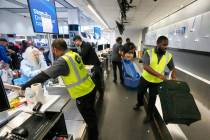
The Biden administration issued final rules Wednesday to require airlines to automatically issue cash refunds for things like delayed flights and to better disclose fees for baggage or canceling a reservation.

Brightline West and federal, state and local officials broke ground on the long-discussed high-speed rail system linking Las Vegas and Southern California.
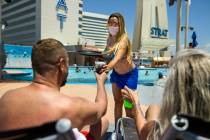
The platform says it’s promoting the rise of “day guesting” – where guests can use a hotel’s amenities like pools, spas and fitness centers without booking a room.
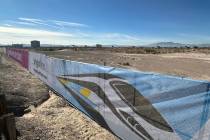
Transportation Secretary Pete Buttigieg is expected to attend the ceremony for the Las Vegas-to-Southern California high-speed train system.

A Las Vegas casino is bringing a Disneyland staple to the skies above downtown. Here’s when it will begin.
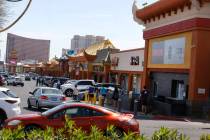
Ahead of plans from Clark County to redevelop the Chinatown area local businesses say traffic and parking should be at the top of the list for issues to be addressed.

Plans include a complete renovation of the casino-resort and further development of 35 unused acres behind it.

Value-driven weddings and streamlined services have given the destination its reputation for more than 70 years.

Hilton has acquired a controlling interest of the operators of this hotel, but the deal excluded the Vegas location.

- Destinations
- Mexico Travel News

Is It Safe to Travel to LAS VEGAS Right Now during Covid?
Disclaimer: Travel restrictions and governmental regulations can change rapidly and the information below might be outdated within a few hours. Therefore, double-check all information with your embassy or on official websites. Traveling Lifestyle does not take any responsibility for your decision to travel.
Nevada (Las Vegas) does not require testing or quarantine for domestic visitors. International arrivals need to comply with the federal laws and bring a negative COVID-19 test result no older than 72 hours prior to their arrival.
The full capacity of all establishments has been reestablished and almost all COVID-19 related restrictions have been lifted, especially for vaccinated travelers. However, the number of COVID-19 cases has surged across Nevada and, therefore, traveling there should be in the next few weeks reconsidered.
Join our: Covid-19 Travel Advice & Support FB Group
Related: – Is It Safe to Visit Hawaii Now? – Is it Safe to Visit New York Now?
How safe is Las Vegas now?
Nevada’s positive cases are at their peak, despite being one of the lowest in the country only about a month ago. The number of daily new cases is higher than ever before, while hospitalizations across the state also soar. Therefore, visiting Nevada for tourism should be reconsidered in the following weeks.
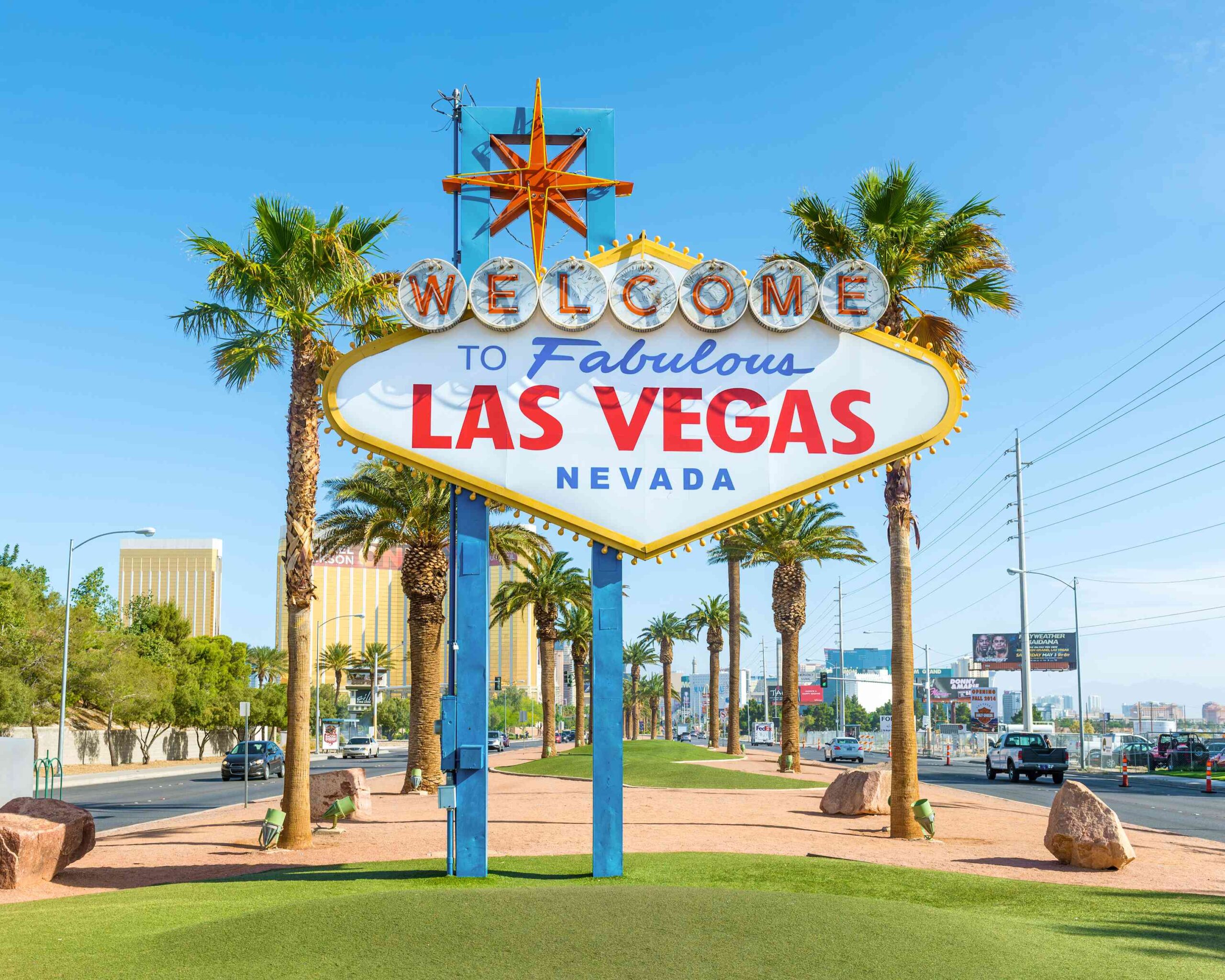
How safe is to visit Las Vegas now: Latest updates
January 12 – las vegas schools to close for five days because of staff shortages due to covid-19.
Due to a high number of COVID-19 infections, the Clark County School District has decided to “pause” in-person education for five days to prevent the spread of the virus.
Schools will close on Friday, January 14, and the staff will be asked to work from home. Face-to-face learning should resume five days later, on Wednesday, January 18.
All athletics, after-school activities, as well as field trips, have also been canceled for the five-day period.
Source: KSNV News
December 10 – Nevada bracing for the arrival of Omicron variant
Nevada is getting ready for the arrival of the new coronavirus variant – the Omicron strain – even though no cases have been found in the state yet. However, Washoe County Health District Officer Kevin Dick said on Wednesday that the new variant might already be spreading around the state undetected.
He believes that the existing vaccines are protective against the much more transmissible Omicron. And although most people who have contracted the new strain experience mild symptoms, Dick stressed the importance of vaccination and booster shots.
He does not think people should panic right now but rather stay aware and get vaccinated if they haven’t done so.
Source: U.S. News
Vaccination Rollout – Time for a bold new strategy
As could not be otherwise, Nevada raffled 5 million dollars among those who got fully vaccinated. To date, 57.1% of the population has received two courses of a COVID-19 vaccine.
Nevada’s unemployment rate (7.8%) is significantly higher than the national one of 5.8 percent. Thus, in order to protect his citizens and boost the economy, the state Governor launched this bold strategy to bribe citizens into getting vaccinated against COVID-19. “While we’re making progress with more than 50% of our eligible residents at least partially vaccinated, we must do more to protect our state. This vaccine incentive promotion is our way to give vaccination efforts an extra boost and encourage all Nevadans to get their shot so our state can recover and build back stronger,” said Sisolak at a press conference.
Are there any COVID-19 restrictions in Las Vegas?
Back on May 1, Governor Steve Sisolak lifted the statewide social distancing requirements against the advice of health authorities.
Las Vegas was “100 percent reopened”. Wearing a face mask indoors is still mandatory though it has been relaxed following updated CDC guidance.
Fully vaccinated travelers can now visit Las Vegas Strip and the surrounding areas without restrictions. Restaurants and nightclubs will be open for them and capacity limits will not apply.
Also, casinos have already opened at 100% capacity.
COVID-19 situation in Nevada
Updated – January 12
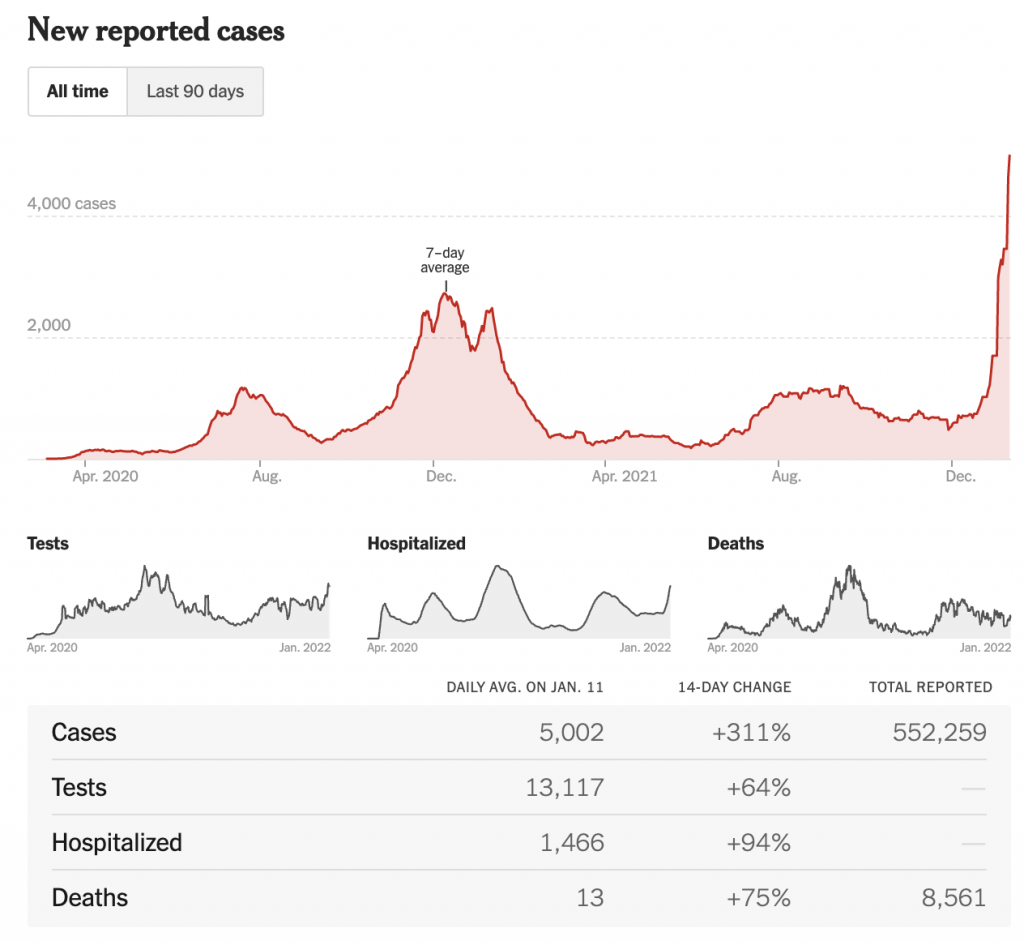
The Nevada Department of Health and Human Services has reported 552,259 cases statewide as of January 12.
Nevada’s Governor still asking for help
Battle Born Medical Corps is an initiative created by Governor Sisolak’s Emergency Directive 011 to help fight the COVID-19 pandemic.
If you are a local healthcare administrator, student practitioner, international medic who got your licensure outside of the US, or a health care retiree you can apply to help relieve the medical personnel in need at ServNV.org .
Planning a visit to New Las Vegas? Here are the rules you need to know

LAS VEGAS – Planning a visit next week to post-pandemic Las Vegas ?
Expect to get your temperature checked.
Nevada gaming authorities have released a new set of rules ahead of Las Vegas Strip properties opening in the wake of the COVID-19 shutdown next week – and mandatory temperature checks are part of the Phase 2 reopening program.
The updated guidelines were released Wednesday following a workshop meeting between health and public safety officials and the state’s Gaming Control Board.
Several Las Vegas hotel-casinos – including Caesars Palace, Bellagio and Wynn – have announced their official reopening date as June 4.
Read the full document here:
Here's what you need to know ahead of hotel-casinos reopening :
Temperature checks
All guests must have their temperatures taken on arrival, and properties must have medical crews on site at all times.
There must also be a designated areas where visitors can be tested for COVID-19 and wait for results.
Masks available on request
Casinos companies like Wynn Resorts, MGM and Caesars Entertainment announced all employees will be required to wear masks at all times.
The Gaming Control Board is now requiring all properties to have masks available for guests, who will be strongly encouraged to wear them.
Don't expect to grab a slot machine next to your sweetheart or best friend.
Gambling in the time of COVID-19 will be more solitary. Occupancy limits in gaming areas will be cut in half.
Tourists will see chairs and stools in front of every other gaming machine.
Properties must regularly disinfect gaming machines, chairs and other equipment, and dealers will even offer card players a complimentary pump of sanitizer between hands.
Crowd police
Social distancing will be remain an everyday part of resort life.
Gathering in groups – one time a staple of the Las Vegas experience – will be prohibited.
Gaming authorities want casino employees to make sure guests don't bunch together.
Checking in, waiting for a table
All restaurants, bars and shops and the casino floor will have plenty of signs reminding guests about distancing.
Some properties will even use plexiglass barriers where distancing is a challenge.
At MGM properties, a contactless check-in system through the MGM Resorts App will allow hotel guests to go through the check-in process on their personal devices with minimal interactions.
At restaurants, guests can expect digital menus to view on mobile devices. To stop groups congregating while they waiting for a table, guests will get text notifications when their seats are ready .
All clubs will remain closed
Don’t expect to hit the clubs, as they'll stay shuttered until further notice.
Ed Komenda writes about Las Vegas for the Reno Gazette Journal and USA Today Network. Do you care about democracy? Then support local journalism by subscribing to the Reno Gazette Journal right here .
Understanding The Las Vegas Travel Restrictions: What You Need To Know
- Last updated Aug 01, 2023
- Difficulty Beginner
- Category United States
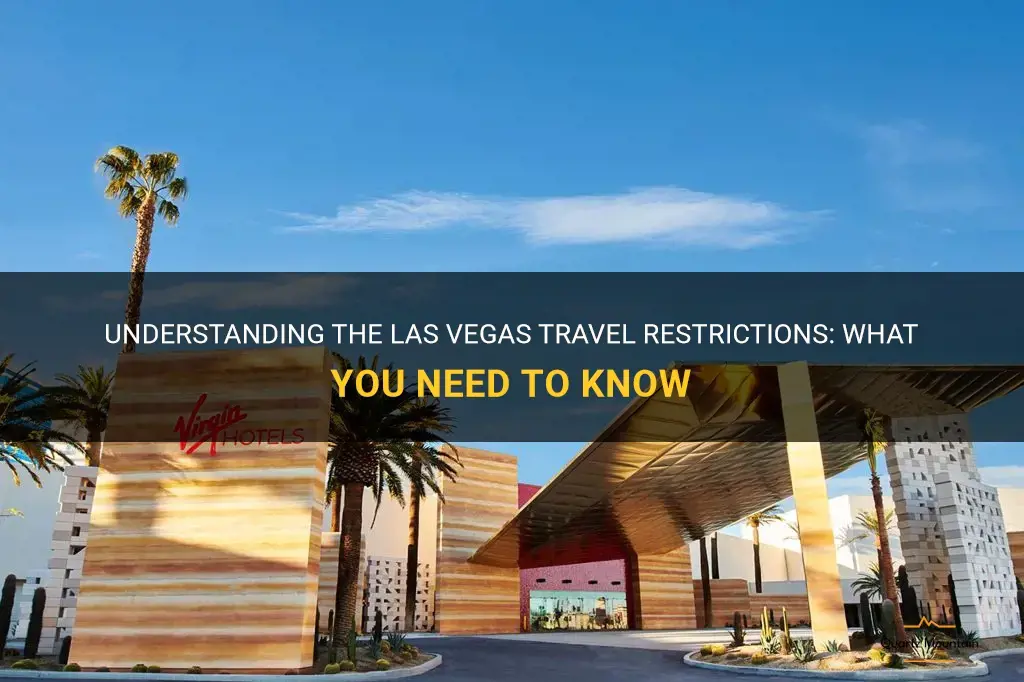
Welcome to the city that never sleeps, where the lights are always bright and the excitement is palpable. Las Vegas, known for its iconic Las Vegas Strip, world-class entertainment, and vibrant nightlife, has long been a top destination for travelers from around the globe. However, with the ongoing COVID-19 pandemic, the city has implemented several travel restrictions to ensure the safety and well-being of both residents and visitors. In this article, we will explore the current travel restrictions in Las Vegas, how they may impact your trip, and what you can still enjoy while in the city. Whether you're a seasoned visitor or planning your first trip to Sin City, it's crucial to stay informed about the latest regulations. So, let's dive in and discover the new Las Vegas experience!
What You'll Learn
What are the current travel restrictions in place for las vegas, can i travel to las vegas from other states or countries, are there any quarantine requirements for travelers arriving in las vegas, what documents do i need to provide to enter las vegas during the pandemic, are there any specific covid-19 testing requirements for travelers visiting las vegas.

Las Vegas, known for its vibrant nightlife, casinos, and entertainment venues, is a popular travel destination for tourists from around the world. However, due to the ongoing global pandemic, travel restrictions and guidelines are in place to ensure the safety of both residents and visitors. If you are planning a trip to Las Vegas, it is important to be aware of the current travel restrictions and guidelines in place.
As of now, Las Vegas has implemented a number of measures to combat the spread of COVID-19. These include restrictions on capacity limits, face mask requirements, and social distancing guidelines. Casinos, hotels, restaurants, and other establishments have implemented various safety protocols to ensure a safe environment for visitors.
One of the main travel restrictions in place for Las Vegas is the requirement for visitors to wear face masks in all indoor public areas. This includes hotels, casinos, restaurants, and other establishments. Face masks must cover the nose and mouth at all times, except when eating or drinking.
In addition to face mask requirements, Las Vegas has implemented capacity limits for businesses and establishments. This means that casinos, restaurants, and other venues are operating at reduced capacity to ensure social distancing. It is important to make reservations in advance and be prepared to wait in lines due to the limited capacity.
Las Vegas also encourages visitors to practice social distancing while in the city. This means maintaining a safe distance of at least six feet from others who are not in your household. While enjoying the city's attractions and entertainment, it is important to be mindful of social distancing guidelines and avoid crowded areas.
Travelers are advised to monitor the situation and check for any updates or changes to travel restrictions before visiting Las Vegas. It is also recommended to follow the guidance provided by health authorities and travel agencies.
In conclusion, Las Vegas has implemented several travel restrictions and guidelines in response to the ongoing COVID-19 pandemic. These include face mask requirements, capacity limits, and social distancing guidelines. Visitors are advised to adhere to these measures to ensure their safety and the safety of others while enjoying the attractions and entertainment the city has to offer.
Exploring Uruguay: A Guide to Current Travel Restrictions
You may want to see also
Las Vegas is one of the most popular tourist destinations in the United States, known for its vibrant nightlife, world-class entertainment, and bustling casinos. If you are planning a trip to Las Vegas, you might be wondering if you can travel there from other states or countries. In this article, we will explore the travel options available to visit Las Vegas from different locations.
Traveling to Las Vegas from other states within the United States is relatively easy. Las Vegas has McCarran International Airport, which is well-connected to major cities across the country. Numerous airlines operate flights to and from McCarran International Airport, making it convenient for travelers to reach Las Vegas. Additionally, Las Vegas is also well-connected by road, and there are several highways that lead to the city.
If you are traveling from another country to Las Vegas, you will need to check the entry requirements for the United States. In general, most travelers will need a valid passport and visa to enter the country. It is advisable to check with the nearest U.S. embassy or consulate in your country for specific visa requirements and travel advisories.
Once you have determined the necessary entry requirements, you can book your flights to Las Vegas. Many international airlines offer direct flights to Las Vegas, making it easier for travelers from other countries to reach the city. Alternatively, you can fly to a major U.S. city and then take a domestic flight to Las Vegas.
If you prefer to travel by road, you can explore the option of driving to Las Vegas from a neighboring country or state. The major highways that lead to Las Vegas, such as Interstate 15, make it accessible by car.
It is important to keep in mind that the current travel situation may be subject to change due to the ongoing COVID-19 pandemic. Travel restrictions and entry requirements can vary, so it is essential to stay updated on the latest guidelines and regulations before planning your trip.
In conclusion, traveling to Las Vegas from other states or countries is possible and relatively easy. Whether you are traveling by air or road, there are several options available to reach this popular tourist destination. However, it is crucial to check the entry requirements and any travel advisories before planning your trip, especially during the current pandemic.
Navigating Erie County's Travel Restrictions: What You Need to Know
Las Vegas, known as the entertainment capital of the world, is a popular destination for tourists from all over the globe. However, due to the ongoing COVID-19 pandemic, travel restrictions and quarantine requirements have been put in place to ensure the safety of residents and visitors alike.
As of now, there are no specific quarantine requirements for travelers arriving in Las Vegas. However, it is important to note that the situation is constantly changing, and it is recommended to stay updated with the latest travel advisories and guidelines before planning a trip to the city.
The state of Nevada, where Las Vegas is located, follows the guidelines set by the Centers for Disease Control and Prevention (CDC) and the World Health Organization (WHO) to prevent the spread of COVID-19. These guidelines include practicing social distancing, wearing face masks in public areas, and frequently washing hands with soap and water.
Travelers are encouraged to follow these guidelines throughout their stay in Las Vegas to help prevent the spread of the virus. Many hotels, resorts, and casinos in the city have implemented additional safety measures, such as enhanced cleaning protocols and reduced capacity limits, to provide a safe environment for guests.
It is important to note that some states and countries may have their own quarantine requirements for travelers returning from Las Vegas or traveling to Las Vegas from certain regions. It is recommended to check the specific guidelines and requirements of your own state or country before planning a trip.
Additionally, it is advisable to check with the airlines or transportation companies regarding any specific travel restrictions or requirements they may have in place. Some airlines may require passengers to present a negative COVID-19 test result before boarding the flight.
Lastly, individuals who have been fully vaccinated against COVID-19 may be exempt from certain travel restrictions or quarantine requirements. However, it is still important to verify the specific guidelines and requirements of the destination and transportation companies before traveling.
In conclusion, as of now, there are no specific quarantine requirements for travelers arriving in Las Vegas. However, it is important to stay updated with the latest travel advisories and guidelines, as the situation is subject to change. Following the recommended guidelines, practicing social distancing, wearing face masks, and maintaining proper hygiene measures will help ensure a safe and enjoyable trip to Las Vegas.
Understanding Taiwan's Travel Restrictions and Mandatory Quarantine Requirements
Las Vegas, like many other cities around the world, requires some additional documentation for travelers wishing to enter during the ongoing COVID-19 pandemic. These measures have been put in place to ensure the health and safety of both residents and visitors. Here is a list of documents that you will need to provide in order to enter Las Vegas during the pandemic:
- Proof of Vaccination: To enter Las Vegas, you will need to provide proof of being fully vaccinated against COVID-19. This can be in the form of an official vaccination card, a digital vaccine passport, or any other recognized document that confirms your vaccination status. Make sure you have this document readily available when entering the city.
- Negative COVID-19 Test Results: In addition to being fully vaccinated, you will also need to present a negative COVID-19 test result. The test should have been taken within a certain timeframe specified by the Las Vegas authorities, usually no more than 72 hours before your arrival. The accepted tests are usually PCR or antigen tests. Make sure to check the specific requirements and timeframes before your trip.
- Electronic Travel Authorization: Las Vegas may require you to complete an electronic travel authorization form prior to your arrival. This form usually asks for basic personal information, your vaccination status, and any recent travel history. It is essential to complete this form accurately and honestly to gain entry into the city.
- Identification Documents: As with any travel, you will also need to present valid identification documents such as a passport or driver's license. Make sure your identification documents are up to date and easily accessible, as they will be required for various checkpoints throughout your journey.
- Face Masks: While not a document, it is important to note that face masks are still required in many indoor spaces and public areas in Las Vegas. Make sure to bring an adequate supply of masks to comply with local regulations and protect yourself and others.
It is important to stay up to date with the latest travel requirements and restrictions in Las Vegas, as they may change depending on the evolving situation. Make sure to check the official government websites or consult with your travel agent before your trip to ensure a smooth entry into the city. Remember, adhering to these guidelines is crucial for the safety and well-being of everyone during these challenging times.
Understanding Turkish Airlines Travel Restrictions during the COVID-19 Pandemic: A Comprehensive Guide
As the COVID-19 pandemic continues to affect travel plans around the world, it is important to stay informed about any specific testing requirements that may be in place for travelers visiting Las Vegas. This popular tourist destination has implemented some measures to ensure the health and safety of both visitors and residents.
Currently, there are no specific COVID-19 testing requirements for travelers visiting Las Vegas. However, it is crucial to keep in mind that the situation is constantly evolving, and it is recommended to check for any updates before your trip.
While there might not be testing requirements enforced, it is highly encouraged that travelers adhere to the general health and safety guidelines. This includes wearing a mask in public places, practicing social distancing, and frequently washing hands or using hand sanitizer.
Furthermore, it is worth mentioning that COVID-19 testing is widely available in Las Vegas. Travelers who wish to get tested before or during their trip can easily find testing sites throughout the city. Many hotels and resorts also offer testing services on-site or provide information on nearby testing locations.
If you are a traveler visiting Las Vegas, it is always a good idea to stay informed and follow the guidelines and recommendations issued by health authorities. Regularly check the official websites of the Centers for Disease Control and Prevention (CDC) and the Southern Nevada Health District (SNHD) for the latest updates and guidelines related to COVID-19.
In summary, although there are currently no specific COVID-19 testing requirements for travelers visiting Las Vegas, it is essential to stay updated on the situation as it can change. Adhering to general health and safety guidelines, such as wearing masks and practicing social distancing, is strongly encouraged. If you wish to get tested, there are many testing sites available in the city. Stay informed, stay safe, and have a memorable visit to Las Vegas.
Exploring the Stunning Azores: Current Travel Restrictions and Guidelines
Frequently asked questions.
Yes, there are travel restrictions in place in Las Vegas. The city and state authorities have implemented measures to limit the spread of COVID-19.
Currently, travelers to Las Vegas are required to wear masks in public spaces and practice social distancing. There may also be limitations on capacity and operating hours for certain businesses and attractions. It is advisable to check the latest guidelines before traveling.
As of now, there are no specific quarantine requirements for travelers to Las Vegas. However, it is still important to monitor the latest updates and follow any guidelines set by the authorities.
Yes, visitors from other states or countries can still visit Las Vegas. However, it is essential to check the requirements and guidelines for travel from your specific location before planning a trip.
COVID-19 tests are not currently required for travelers to Las Vegas. However, it is recommended to check the latest guidelines and requirements before traveling, as the situation can change. It is also essential to follow any testing requirements set by your airline or transportation provider.

- Lazar Odonnell Author

- Michaela Krajanova Author Reviewer Traveller
It is awesome. Thank you for your feedback!
We are sorry. Plesae let us know what went wrong?
We will update our content. Thank you for your feedback!
Leave a comment
United states photos, related posts.
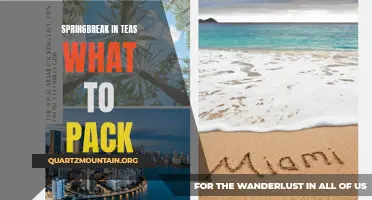
Essential Packing Guide for the Ultimate Spring Break in Texas
- Dec 03, 2023
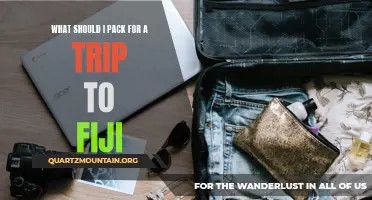
Essential Items to Pack for Your Trip to Fiji
- Dec 10, 2023
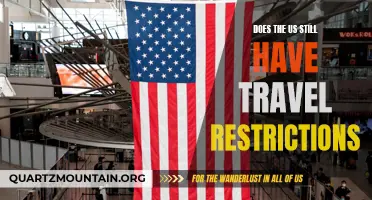
Does the US Still Have Travel Restrictions?
- Sep 01, 2023

12 Fun Activities to Experience in San Diego in January
- May 07, 2023
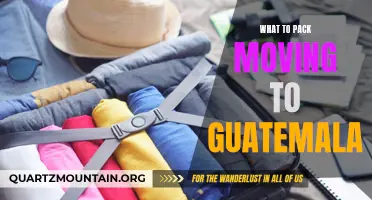
Essential Items to Include When Packing for a Move to Guatemala
- Feb 23, 2024

Essential Items to Pack for a Three-Day Volleyball Camp
- Dec 18, 2023
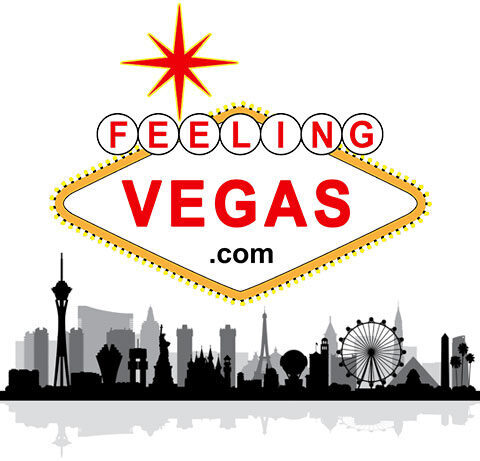
Do You Need a Passport To Go to Las Vegas? (Vegas Travel ID)
(This article may contain affiliate links, which means we might earn a small commission if you click and make a purchase. Thank you!)
You may be headed to Las Vegas, Nevada with plans to put it all on red, but there’s one thing you don’t want to leave to chance, and that’s your travel arrangements.
Please enable JavaScript

Depending on where you’re coming from, there are different requirements for entry at the Las Vegas airport.
Additionally, around the city, you’ll encounter strict identification laws due to the nature of the city’s vice-fueled culture.
You may need a passport to travel to Las Vegas, depending on your nationality, residency status, and the origin of your flight.
All travelers from outside the United States require a passport, while US citizens and residents only require a state ID or driver’s license on domestic flights.
Keep reading for all the detailed information to keep you informed about what identification is accepted at each stage of your trip.
Make sure that local laws and regulations don’t get in the way of your trip to Sin City and its sea of famous casinos.
Inside this article:
What Identification Do You Need To Travel to Vegas?
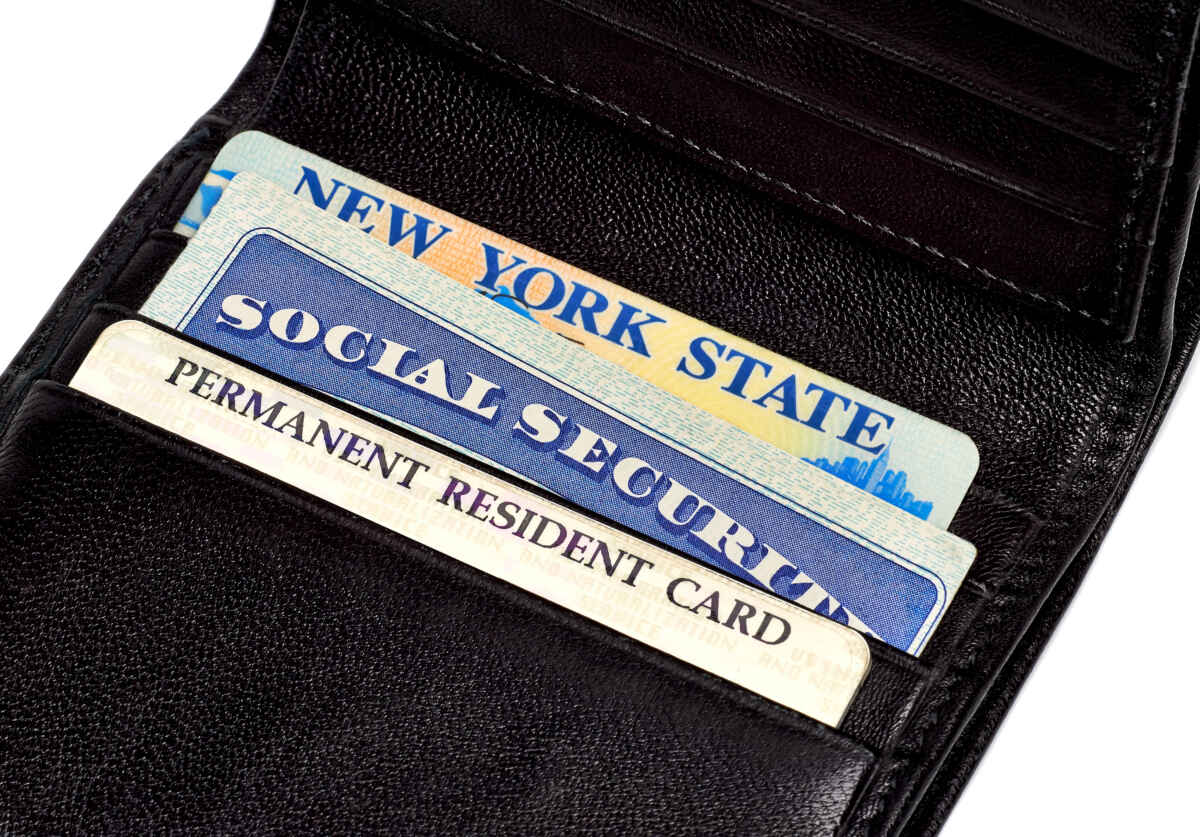
The identification you need to travel to Vegas depends on your flight’s point of origin, your residency status, and your nationality.
Based on these factors, travelers will need a government-issued ID, driver’s license, or passport.
Travelers From Inside the US
If you’re flying from inside the United States and you’re a US resident, then you have options when it comes to presenting identification for your Vegas trip.
This can be a driver’s license, state-issued ID card, military ID, passport, or several other acceptable documents .
You’ll need to present this ID whenever you check in for your flight and go through security.
Make sure your ID is current and not expired, as you may be denied boarding if it is.
Additionally, make sure to carry this ID with you if you plan on gambling, as you’ll likely need to prove you’re over 21.
For foreign non-residents traveling from within the US, you’ll be required to present a valid passport as identification to board your flight.
This is the same requirement you had upon entering the country, and you won’t face any additional requirements to fly to Las Vegas.
Note: the REAL ID Act is set to go into effect and impacts US travelers using state-issued ID to fly.
Below I’ve provided an overview of what you need to know about whether your ID will be impacted.
Travelers From Outside the US
If your travels begin outside the border of the United States, or if you’re not a US resident, then you’ll experience different identification requirements to you to board your flight and enter the country.
This pertains both to the documents needed for boarding the flight as well as age verification while in Las Vegas.
To fly into Las Vegas from outside the US, you’ll need a current passport with at least six months of validity remaining on it.
You’ll also need to have at least one blank page in your passport to allow for entry and exit stamps.
Depending on your citizenship and the purpose of your trip, you may need to obtain a visa before you can enter the United States.
To get one, you typically need to apply for a visa at a U.S. embassy or consulate in your home country.
The process can take several weeks or even months, so it’s important to start early if you think you’ll need a visa.
Can You Fly in the US Without a REAL ID?
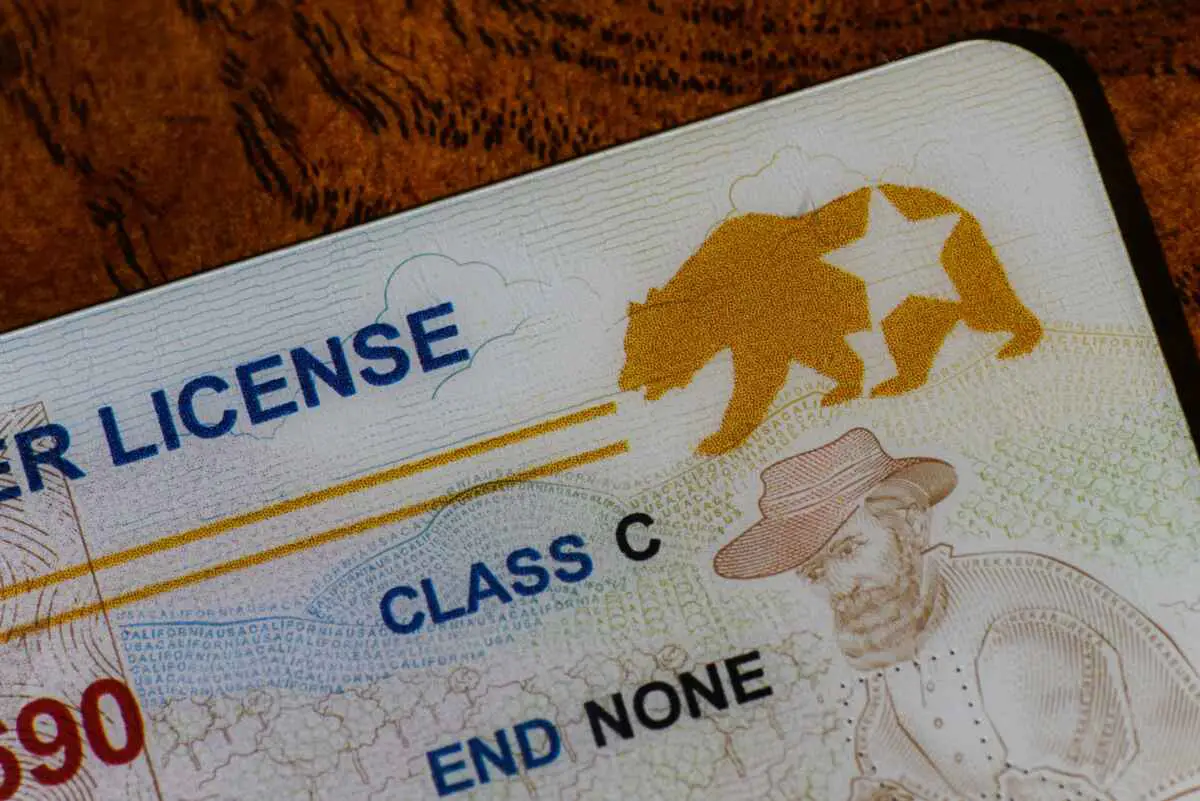
As of May 7, 2025, U.S. travelers will need to hold a driver’s license that is REAL ID-compliant or an alternative form of permissible identification to fly inside the U.S.
This applies to all domestic flights, as well as flights to U.S. territories such as Puerto Rico and the U.S. Virgin Islands.
The REAL ID Act is a federal law that sets standards for state-issued driver’s licenses and identification cards.
It was enacted in 2005 to improve the security and integrity of state-issued identification documents.
If you’re not sure whether your driver’s license or identification card is REAL ID-compliant, you can check with your state’s department of motor vehicles.
Many states have already been issuing compliant licenses and IDs for years, but some may still be in the process of implementing the new standards.
If you don’t have a REAL ID-compliant driver’s license or identification card, you’ll need to bring an alternative form of acceptable identification with you when you fly.
Some examples of alternative forms of identification include a passport, a U.S. military ID, or a permanent resident card.
Do You Need a Travel Visa To Go to Las Vegas? (Visa Waiver)
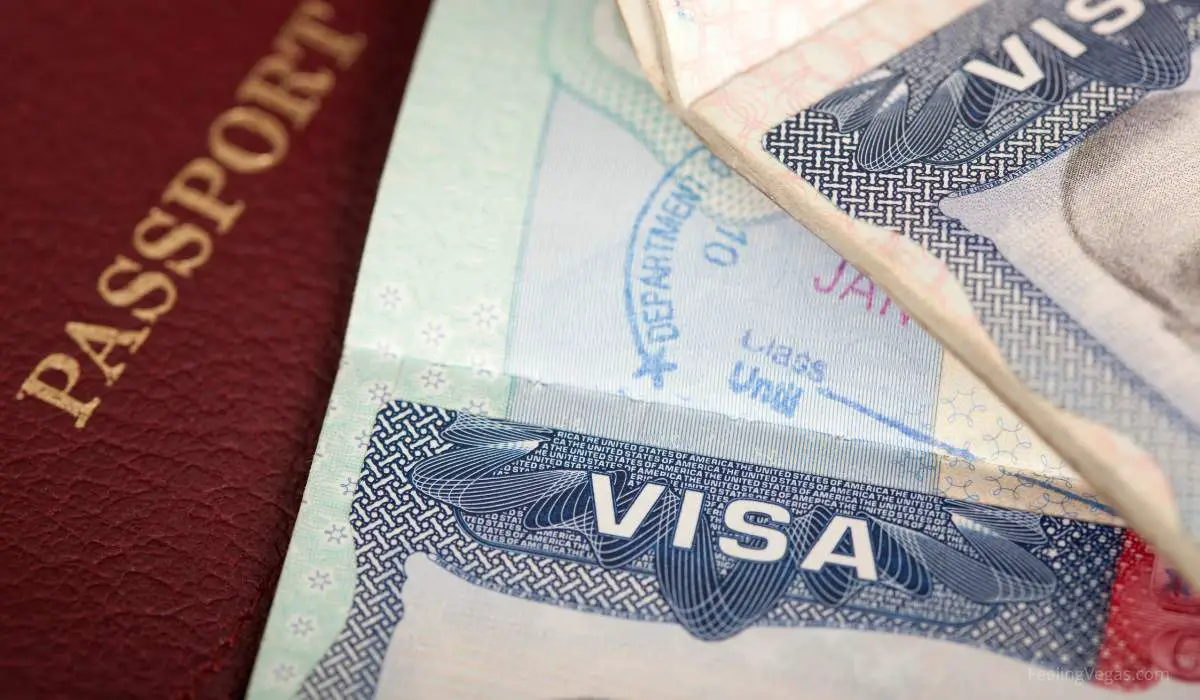
While planning your Vegas getaway, you may be wondering if you need a visa to enter the United States.
Obviously, if you’re a US citizen or resident, then there’s no need for a visa. Otherwise, it depends on where you’re coming from and what your purpose is for visiting.
If you’re a citizen of a country that participates in the Visa Waiver Program (ESTA VWP), you may be able to enter the United States without a visa for stays of 90 days or less for tourism or business purposes.
However, your application must be approved before you can land in the US.
Citizens of countries outside the program need to obtain a visa before gaining entry to the United States.
This typically involves applying for a visa at a U.S. embassy or consulate in your home country.
Depending on the nature of your visit, you may be able to apply for several different types of visas. Some of the most common ones include:
- Tourist visa (B-2): These visas are for people who want to visit the United States for tourism, to visit friends or family, or for other activities not related to work or study.
- Business visa (B-1): These visas are for people who want to enter the United States for business purposes, such as attending meetings or conferences.
- Student visa (F-1): These visas are for people who want to study in the United States at a college or university.
Do You Need an ID for Vegas Casinos?
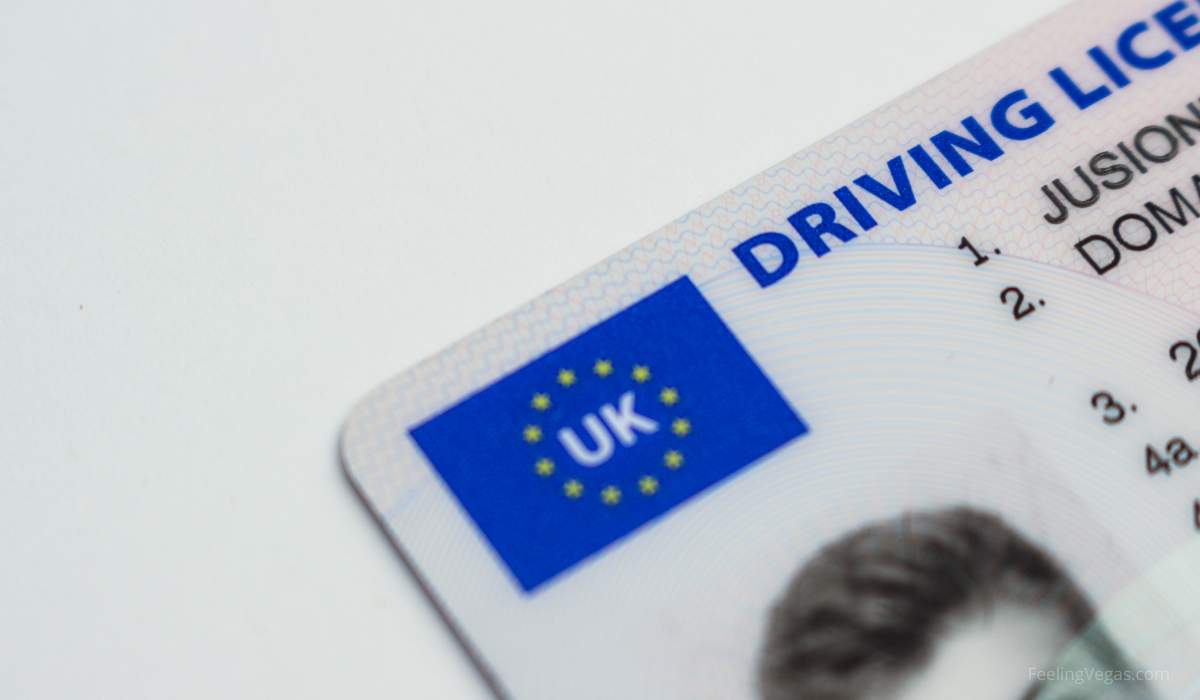
If you are planning to visit Las Vegas, you might be having a difficult time figuring out if you need an ID to enter any of the casinos.
This can be difficult to research because the answer depends on the casino in question, as each has different guidelines.
Some Las Vegas casinos require an ID for entry (though most do not). If you’re not of age or don’t have a valid identification card, you may be turned away at the door.
Circa in downtown Las Vegas is an example of a casino resort that requires identification for entry, proving that you are over 21.
Moreover, all players must have a valid ID on them while they’re playing in order to verify their age and identity.
This is most typical, and for the majority of casinos, the only time that you will need an ID is if you want to gamble or drink.
The staff or security may ask to see your ID at any time . If you don’t have one, you will be asked to leave.
So, if you want to eat at a restaurant or go shopping, then no ID is needed at a majority of Las Vegas casinos or resorts.
If you plan on gambling at a Las Vegas casino without an ID card, you should bring some form of photo identification with you.
You should also bring another form of identification that might be necessary if there is any question about your age or your identity.
This is especially important if you win big. Casinos in Las Vegas will only pay out winnings if you have current identification.
RELATED: Here’s What Happens If You Win Big in Las Vegas
Do Casinos Accept a Passport in Las Vegas?
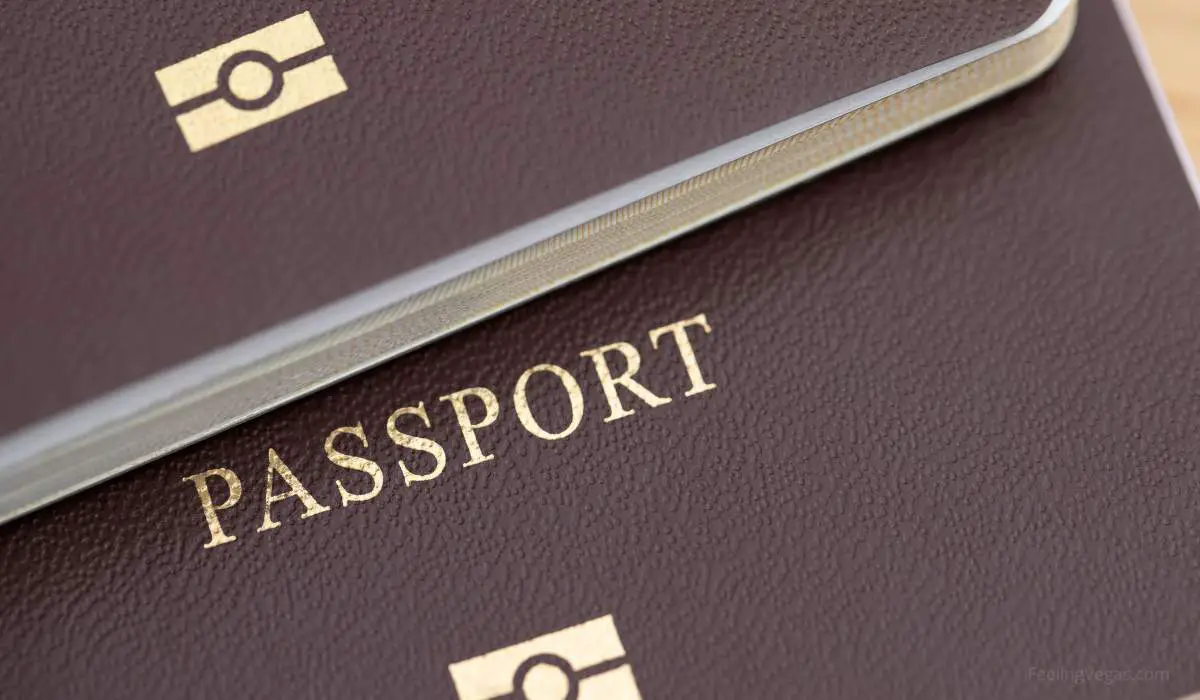
The answer is generally yes. Most casinos in Las Vegas accept passports as a valid form of identification when you check in or when you’re asked to prove your age or identity.
Casinos are required to follow strict laws and regulations when it comes to gambling, and one of those regulations is verifying the age of their customers.
To gamble in a Las Vegas casino, you must be at least 21 years old.
Casinos use various methods to verify your age, including asking for a government-issued photo ID (even if it’s from another country), such as a driver’s license, state ID, or passport.
It’s also worth noting that while most casinos in Las Vegas will accept passports as identification, there may be some that have their own policies in place.
That’s why it’s always a good idea to check with the specific casino you’re planning to visit to find out their ID requirements.
Can 18-Year-Olds Go to Casinos in Las Vegas?
One question that often comes up when planning a trip to Las Vegas, especially as the city becomes more popular with families, is whether 18-year-olds are allowed to enter casinos.
The answer is: it depends.
In the state of Nevada, the legal gambling age is 21.
In other words, anyone under the age of 21 is not allowed to gamble in casinos or participate in other forms of gambling, such as sports betting.
However, while 18-year-olds are not allowed to gamble in casinos, they are generally allowed to enter them and walk through the casino floor without lingering.
Most Las Vegas casinos have attractions and amenities that are open to all ages, such as restaurants, shows, and shopping centers.
So if you’re 18 and you want to visit a casino in Las Vegas, you’ll likely be able to do so as long as you don’t try to gamble.
That being said, individual casinos may have their own policies about age restrictions, and some may not allow anyone under the age of 21 to enter at all.
So, always check with the specific casino you’re planning to visit and ask about their age policies.
What Can You Do in Las Vegas Without an ID?

Las Vegas is known for its casinos and nightlife, but there are plenty of other things to do in the city that don’t require you to have an ID.
If you find yourself in Las Vegas without an ID, or if you’re under the age of 21 and not allowed to gamble, here are some ideas for things to do:
- Visit the Las Vegas Strip: The Las Vegas Strip is home to many of the city’s most famous hotels, casinos, and attractions. You don’t need an ID to walk around and take in the sights and sounds of the Strip. You can also visit some of the free attractions that are open to the public, such as the Bellagio fountain show .
- Go shopping: Las Vegas is home to many shopping centers and outlets where you can find great deals on clothes, accessories, digital devices, and other goods. You don’t need an ID to shop in most stores, so you can browse to your heart’s content. You can also find many unique items to bring back home as souvenirs from your trip to Sin City.
- Check out the museums: Probably not the most obvious attraction in Las Vegas, but there are several amazing museums , including the Mob Museum and the Neon Museum, where you can learn about the city’s history and culture.
- Take a tour: Las Vegas is home to many tour companies that offer guided tours of the city’s nearby attractions, including the Grand Canyon, Hoover Dam, and the Las Vegas Strip itself.
- Go to a show: Las Vegas is known for its live entertainment, and you don’t need an ID to see a show. There are many theaters and venues that offer a variety of performances, ranging from concerts and comedy shows to magic acts and Cirque du Soleil productions. Check out our page for an up-to-date list of shows and concerts .
Remember that using a fake ID is considered fraud, and the staff can spot it immediately.
Read my guide to learn more about why using a fake ID is illegal in Vegas, and what happens if you get caught.
More To Read:
- Getting to the Strip From the Las Vegas Airport (7 Ways)
- Here’s How Much Money You Should Bring to Las Vegas
- 6 Things You Need Cash for in Las Vegas (Explained)
- How Early To Arrive At Las Vegas Airport? (Flying Home)
Don’t roll the dice when it comes to your travel arrangements for your big trip to Las Vegas.
All travelers will need to provide valid government-issued identification to fly to the Nevada destination.
Various requirements, however, affect travelers depending on their origin and nationality.
Plus, much of what makes Vegas known as “Sin City” requires guests to prove they’re 21 years old, so make sure to know what identification you need to carry.
However, if you haven’t reached the legal age, there are still plenty of things to do that’ll make your visit to Vegas a most memorable experience.
As a Vegas local who enjoys experiencing everything the city has to offer, Wendy is uniquely qualified to provide insider tips and recommendations to anyone visiting Las Vegas.
Similar Posts
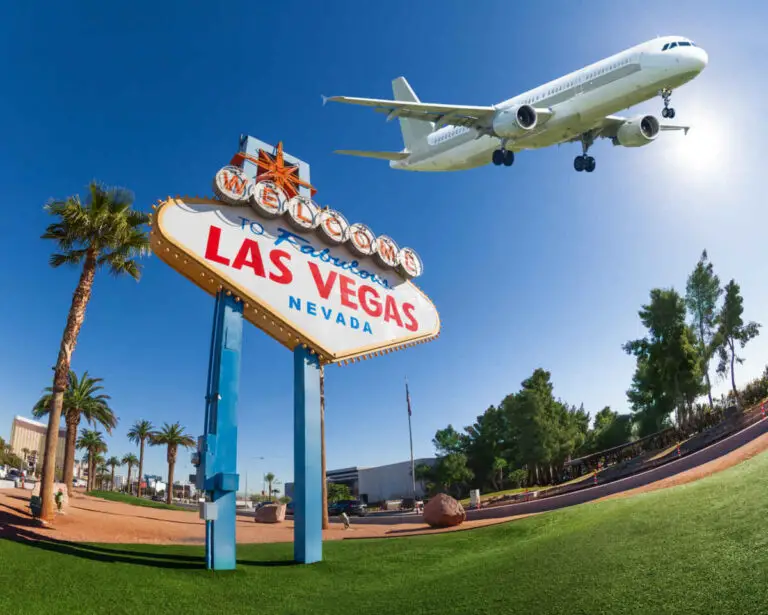

How to Find Cheap Flights to Las Vegas: Save Big on Your Next Adventure!
Las Vegas is a destination that promises excitement and entertainment, and getting there doesn’t have to break the bank. With a little savvy planning and flexibility, you can find cheap flights to Las Vegas that will leave you with more money to spend on the fun activities that await you in the city. In 2024,…
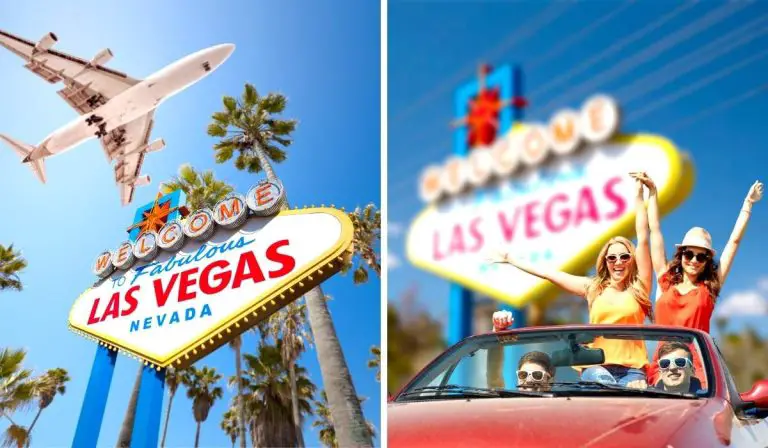
Is It Better To Fly or Drive to Las Vegas? (Pros & Cons)
Every year, millions of people from around the world visit Las Vegas to gamble and see the shows. But what’s the best way to get there, flying or driving? Flying to Las Vegas is the better option for many people. It takes less time and is more convenient, but flying can be more expensive than…
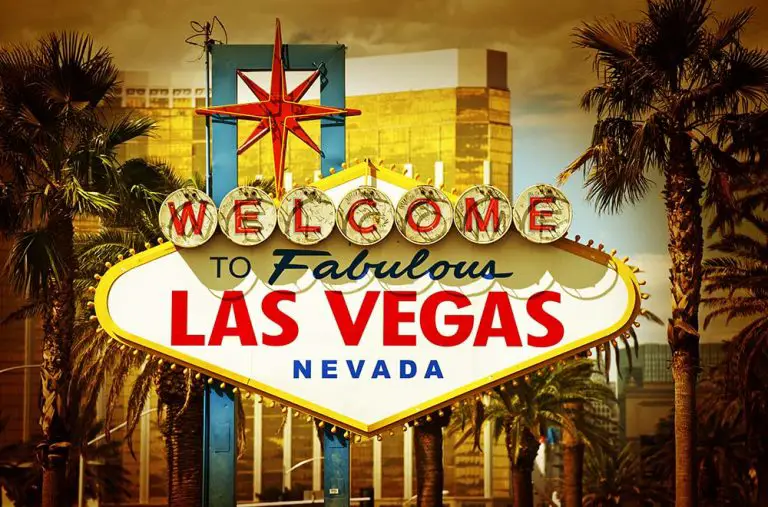
Cheapest Time to Visit Las Vegas (Monthly Price Comparison)
Las Vegas is one of the most beautiful, thrilling cities in the United States. Unfortunately, this also means that it can sometimes be difficult to come by affordable hotels and airlines. Here are some of the cheapest months to visit Las Vegas. The cheapest time to visit Las Vegas is December and January, with July…
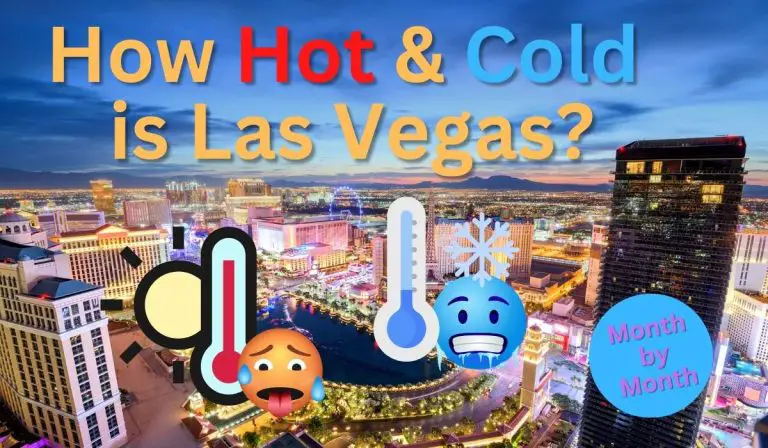
Hot & Cold Temps in Las Vegas (Month-by-Month Weather)
Las Vegas is full of shows, concerts, and attractions, no matter what season you visit. However, Vegas weather is a concern for many people, considering our temperature extremes. But how do monthly temperatures change in Vegas? Compared to much of the United States, Las Vegas never really gets cold. The lowest average temperature you expect…
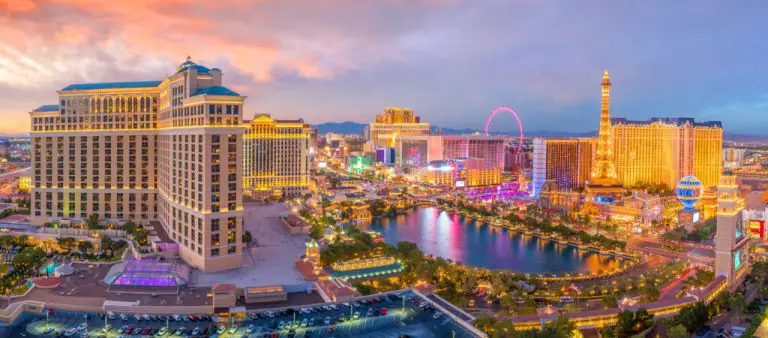
Preparing For Your Las Vegas Trip (17 Things to Know!)
Vegas, Sin City, the “Entertainment Capital of the World”, no matter what you call it, Las Vegas, Nevada is known worldwide for its ability to awe and excite tourists on every level! If you’re planning a trip to this amazing city for vacation (or even a workcation), there are some things you should know ahead…
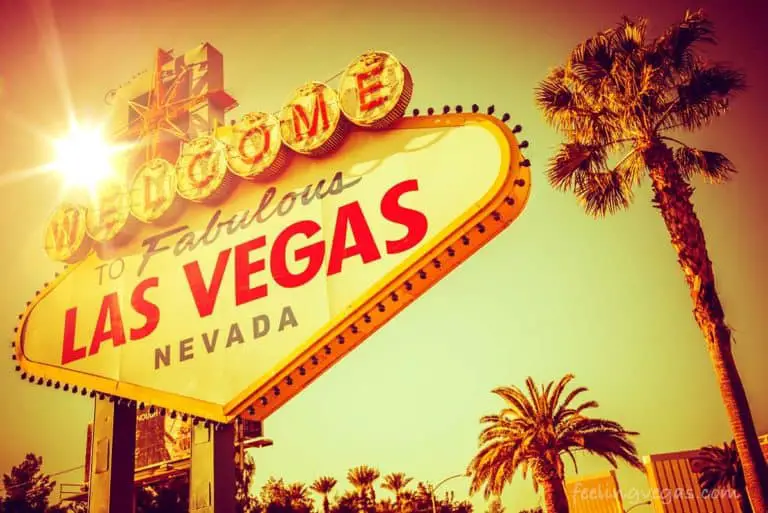
How Long Should You Stay in Las Vegas – The Ultimate Guide
For first-time visitors and veterans alike, a getaway to Las Vegas can be an exhilarating experience. However, sometimes, people worry that staying too long could be overwhelming. How long should you stay in Vegas before you run out of patience, out of things to do, or out of money? If gambling or partying is your…
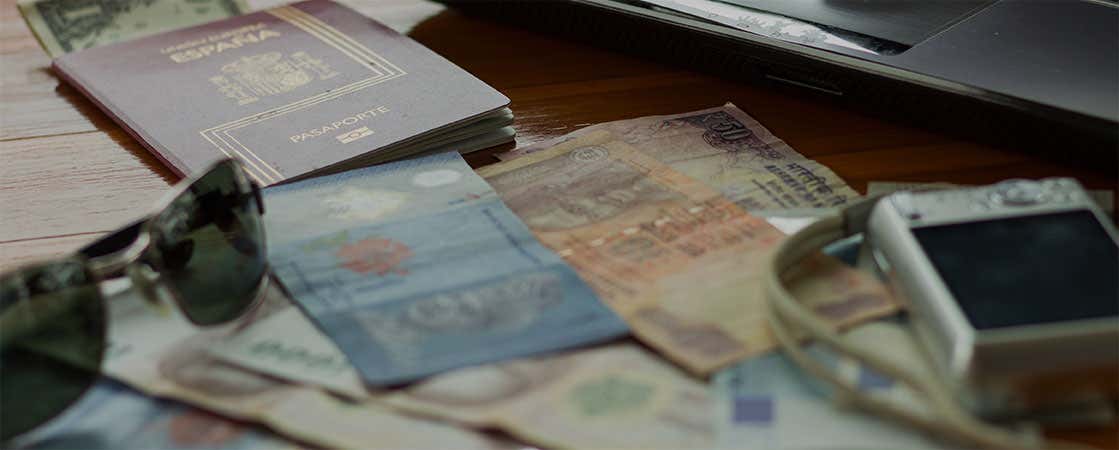
- Information
Plan your trip
Las vegas travel documents.
In order to enter the USA, there are three types of visa: tourist, work and student. We explain here how you can obtain a tourist visa. For other visa application, we recommend contacting the United States embassy in your country.
For non-US citizens intending to enter the country, there are three different visas: a temporary visa (for tourists), a green card (for permanent residence), and student visas. We will explain here how to apply for a temporary visa. For other types of visas, we recommend contacting the U.S. Embassy in your respective country.
British and Australian Citizens
British and Australian passport holders may visit the U.S. for up to 90 days on the Visa Waiver Programme (VWP) . Your passport must be valid for the intended length of your stay.
If you are arriving by air or by sea, you will be asked to fill out the Electronic System for Travel Authorisation (ESTA) form online at least 72 hours before traveling .
- Fill out the ESTA form here
Other Countries Included in the Visa Waiver Programme (VWP)
The VWP also permits citizens of the following countries to enter the United States for up to 90 days with a valid passport, filling out the ESTA form 72 hours before traveling.
Andorra, Austria, Belgium, Brunei, Chile, Czech Republic, Denmark, Estonia, Finland, France, Germany, Greece, Hungary, Iceland, Ireland, Italy, Japan, Latvia, Liechtenstein, Lithuania, Luxembourg, Malta, Monaco, Netherlands, New Zealand, Norway, Portugal, San Marino, Singapore, Slovakia, Slovenia, South Korea, Spain, Sweden, Switzerland, Taiwan.
Countries Not Included in the VWP
Citizens of countries not included in the above list must obtain a visa before traveling to the United States. We recommend contacting the Embassy of the United States of your country for more information.
More Information
For further information, we recommend you visit the official U.S. Department of State website:
- Official website
You may also be interested in
Before traveling to Las Vegas there are many things to consider: Where can I exchange money? What type of plug connections do they use? What type of visa do I need?
Travel Insurance
Before heading to the United States, we recommend that you take a look at how healthcare and travel insurance works in the country. Healthcare is private, and you could get stung by some high prices if you're a tourist.
Cookies on GOV.UK
We use some essential cookies to make this website work.
We’d like to set additional cookies to understand how you use GOV.UK, remember your settings and improve government services.
We also use cookies set by other sites to help us deliver content from their services.
You have accepted additional cookies. You can change your cookie settings at any time.
You have rejected additional cookies. You can change your cookie settings at any time.
- Passports, travel and living abroad
- Travel abroad
- Foreign travel advice
Warnings and insurance
This travel advice also covers American Samoa, Guam, Northern Mariana Islands, Puerto Rico, and United States Virgin Islands.
Before you travel
No travel can be guaranteed safe. Read all the advice in this guide and any specific travel advice that applies to you:
- women travellers
- disabled travellers
- LGBT+ travellers
- solo and independent travel
- volunteering and adventure travel
Travel insurance
If you choose to travel, research your destinations and get appropriate travel insurance . Insurance should cover your itinerary, planned activities and expenses in an emergency.
About FCDO travel advice
The Foreign, Commonwealth & Development Office ( FCDO ) provides advice about risks of travel to help British nationals make informed decisions. Find out more about FCDO travel advice .
Follow and contact FCDO travel on Twitter , Facebook and Instagram . You can also sign up to get email notifications when this advice is updated.
Related content
Is this page useful.
- Yes this page is useful
- No this page is not useful
Help us improve GOV.UK
Don’t include personal or financial information like your National Insurance number or credit card details.
To help us improve GOV.UK, we’d like to know more about your visit today. We’ll send you a link to a feedback form. It will take only 2 minutes to fill in. Don’t worry we won’t send you spam or share your email address with anyone.
- Skip to main content
- Skip to "About this site"
Language selection
Search travel.gc.ca.
Help us to improve our website. Take our survey !
COVID-19: travel health notice for all travellers
United States travel advice
Latest updates: Editorial change
Last updated: April 18, 2024 11:47 ET
On this page
Safety and security, entry and exit requirements, laws and culture, natural disasters and climate, united states - take normal security precautions.
Take normal security precautions in the United States
Back to top
Border with Mexico
Criminal incidents associated with drug trafficking are more frequent at the border with Mexico, in the following states:
If crossing the U.S.– Mexico border by car:
- remain extremely vigilant
- only use officially recognized border crossings
- avoid travelling at night
Petty crime
Petty crime, such as pickpocketing and purse snatching, occurs, particularly in urban centres and tourist locations.
- Don’t leave bags or valuables unattended in parked cars, especially rental vehicles, even in trunks
- Ensure that your belongings, including passports and other travel documents, are secure at all times
Violent crime
Within large urban areas, violent crime more commonly occurs in poor neighbourhoods, particularly from dusk to dawn. It often involves intoxication. Incidents of violent crime are mainly carried out by gangs or members of organized crime groups but may also be perpetrated by lone individuals. Although violent crime rarely affects tourists:
- be mindful of your surroundings at all time
- verify official neighbourhood crime statistics before planning an outing
- if threatened by robbers, stay calm and don’t resist
Crime Data Explorer – Federal Bureau of Investigation
Gun violence
The rate of firearm possession in the US is high. It’s legal in many states for US citizens to openly carry firearms in public.
Incidences of mass shootings occur, resulting most often in casualties. Although tourists are rarely involved, there is a risk of being in the wrong place at the wrong time.
Familiarize yourself on how to respond to an active shooter situation.
Active Shooter Event Quick Reference Guide - Cybersecurity and Infrastructure Security Agency
Home break-ins
Canadians living in holiday homes have been the victims of break-ins and burglary.
Make sure you lock windows and doors securely at night and when you are away.
Common criminal strategies
Be on alert for robbery ploys targeting visitors.
Some criminals on highways target travellers leaving airports or other tourist destinations. They signal tourists to stop due to an issue with their vehicle. They then wait for the driver to pull over or exit the car before grabbing exposed valuables. Criminals may also throw items at the windshield, obscuring the view of the road and forcing the driver to pull over.
If you’re the victim of such a ploy:
- avoid pulling over on the side of the road
- put on your hazard lights and slowly drive to a gas station, police station or other safe and populated area
Demonstrations
Demonstrations may occur. Even peaceful demonstrations can turn violent at any time. They can also lead to disruptions to traffic and public transportation.
- Avoid areas where demonstrations and large gatherings are taking place
- Follow the instructions of local authorities
- Monitor local media for information on ongoing demonstrations
Mass gatherings (large-scale events)
Credit card and ATM fraud occurs, including debit card cloning. Be cautious when using debit or credit cards:
- pay careful attention when your cards are being handled by others
- use ATMs located in well-lit public areas or inside a bank or business
- avoid using card readers with an irregular or unusual feature
- cover the keypad with one hand when entering your PIN
- check for any unauthorized transactions on your account statements
Overseas fraud
There is a threat of terrorism. Terrorist attacks could occur at any time.
Targets could include:
- government buildings, including schools
- places of worship
- airports and other transportation hubs and networks
- public areas such as tourist attractions, restaurants, bars, coffee shops, shopping centres, markets, and hotels
Always be aware of your surroundings when in public places.
The U.S. Department of Homeland Security (DHS) maintains a public alert system on terrorism to communicate information about terrorist threats.
National Terrorism Advisory System – U.S. Department of Homeland Security
Hiking and mountaineering
If you intend on hiking, backpacking or skiing:
- never practise these activities alone and always hire an experienced guide from a reputable company
- buy travel insurance that includes helicopter rescue and medical evacuation
- obtain detailed information on hiking routes or ski slopes before setting out and do not venture off marked trails or slopes
- ensure that your physical condition is good enough to meet the challenges of your activity
- ensure that you are properly equipped and well informed about weather and other conditions that may pose a hazard
- inform a family member or friend of your itinerary, including when you expect to be back to camp
- know the symptoms of acute altitude sickness, which can be fatal
We do not make assessments on the compliance of foreign domestic airlines with international safety standards.
Information about foreign domestic airlines
Every country or territory decides who can enter or exit through its borders. The Government of Canada cannot intervene on your behalf if you do not meet your destination’s entry or exit requirements.
We have obtained the information on this page from the US authorities. It can, however, change at any time.
Verify this information with the Foreign Representatives in Canada .
You must provide proof of your Canadian citizenship upon entry to the U.S. There are several documents that can satisfy this requirement.
Travel by air
Canadian citizens travelling by air to the United States must present one of the following documents:
- a passport, which must be valid for the duration of their stay
- a valid NEXUS card, used at self-serve kiosks at designated airports
This requirement applies to all Canadian citizens, including children, travelling by air to or even just transiting through the United States.
Useful links
- Canadian passports
- Mobile Passport Control app – U.S. Customs and Border Protection
Travel by land or water
As per the Western Hemisphere Travel Initiative (WHTI), Canadian citizens aged 16 years and older must present one of the following documents when entering the United States by land or water:
- a valid passport
- a Trusted Traveler Program card
- an enhanced driver’s licence (EDL) or enhanced identification card (EIC) from a province or territory where a U.S. approved EDL/EIC program has been implemented
- a Secure Certificate of Indian Status
The WHTI-compliant document you choose to use must be valid for the duration of your stay.
Canadian citizens aged 15 years and under entering the United States by land or water require one of the following documents:
- an original or a copy of a birth certificate
- an original Canadian citizenship certificate
- Western Hemisphere Travel Initiative (WHTI ) – U.S. Customs and Border Protection
- Trusted Traveler Programs – U.S. Customs and Border Protection
- Enhanced Driver’s Licenses: What Are They? – U.S. Department of Homeland Security
- Apply for a Secure Certificate of Indian Status – Indigenous Services Canada
Other travel documents
Different entry rules may apply when travelling with a temporary passport or an emergency travel document. Before you leave, check with the closest diplomatic mission for your destination.
- Foreign representatives in Canada
Additional information at borders
Customs officials may ask you to provide your address while in the United States (including Puerto Rico). Customs Border Protection (CBP) officers may also ask for:
- evidence of residential, employment or educational ties to Canada
- proof that the trip is for a legitimate purpose and is of a reasonable length
- proof of sufficient funds to cover your stay
Dual citizens
Although U.S. authorities don’t formally require dual nationals to carry both a U.S. and a Canadian passport, carrying both documents as proof of citizenship may facilitate your entry into the United States and your return to Canada.
- Travelling as a dual citizen
- Dual Nationality – U.S. Department of State, Bureau of Consular Affairs
Canadian visitors can usually stay in the United States for 6 months without a visa. You must declare your intended duration of stay upon entry into the United States.
In most circumstances, Canadian citizens don’t require visitor, business, transit or other visas to enter the United States from Canada but there are some exceptions.
Canadians Requiring Visas – U.S. Embassy & Consulates in Canada
Canadian permanent residents
Canadian permanent residents may need a non-immigrant visa to enter the United States.
You must obtain this visa from the U.S. authorities before entering the country. You must also have a valid passport from your country of citizenship.
Cross U.S. Borders – U.S. Customs and Border Protection
Visa Waiver Program
If you are a citizen of a country that is part of the visa waiver program (VWP), you don’t need a visa to enter the U.S. for stays up to 90 days. Instead, you must obtain pre-travel authorization via the Electronic System for Travel Authorization (ESTA) prior your departure.
- Visa Waiver Program – U.S. Customs and Border Protection
- Countries participating in the Visa Waiver Program – U.S. Customs and Border Protection
- Electronic System for Travel Authorization (ESTA) – U.S. Department of Homeland Security
You must also carry proof of Permanent Resident Status in Canada upon re-entry into Canada.
U.S. permanent residents
Canadians who are permanent residents of the United States must present a valid U.S. permanent resident card upon entry.
International travel as a U.S. Permanent Resident – U.S. Citizenship and Immigration Services
First Nations and Native Americans born in Canada
Members of Canada’s First Nations and Native Americans born in Canada may freely enter the United States for the purposes of employment, study, retirement, investing, or immigration.
- Entry and exit for First Nations and Native Americans – U.S. Embassy & Consulates in Canada
- Green Card for an American Indian Born in Canada – U.S. Citizenship and Immigration Services
Working in the United States
Most Canadian business travellers may apply for admission at a U.S. port of entry without first obtaining a non-immigrant visa. However, travellers entering the United States in certain business-related categories are required to present specific documents to establish eligibility for admission.
If you plan to work in the United States, contact the nearest U.S. embassy or consulate for specific requirements.
- Foreign Representatives in Canada
Studying in the United States
Canadian citizens don’t need visas to study or participate in a student exchange program in the United States. However, they need to be registered with SEVIS, a U.S. student tracking system. Students must present their registration form to CBP officers each time they enter the United States.
- SEVIS – U.S. Department of Homeland Security
- Canadian students – U.S. Embassy & Consulates in Canada
Length of stay
If you wish to stay longer than 6 months, you must apply for an extension at the nearest U.S. Citizenship and Immigration Services (USCIS) office once you are in the United States and before the expiry of your initial authorized stay. Immigration officers may ask you to demonstrate that you are a temporary visitor in the United States.
The U.S. government strictly enforces immigration regulations. Remaining in the United States beyond your authorized period of stay can result in serious consequences such as detention or deportation.
There is no set period that you must wait to re-enter the United States after the end of your authorized stay. However, if a CBP officer suspects you are spending more time in the United States than in Canada, it will be up to you to prove to the officer that you are a temporary visitor, not a U.S. resident.
Extend your stay – U.S. Citizenship and Immigration Services
Upon entry into the United States, non-U.S. citizens must provide biometrics, such as digital fingerprints and a photograph.
Most Canadian citizens are exempt from this requirement. However, it will apply to Canadian citizens who:
- need a visa or a waiver of ineligibility
- must obtain an I-94 Arrival/Departure Record form to document dates of entry and exit from the country
Random screenings of exempt Canadians have occurred at border crossings and airports. If you feel that your information has been wrongfully collected, you can address the issue directly with the U.S. Department of Homeland Security.
- Biometrics – U.S. Department of Homeland Security
- Arrival/Departure Forms: I-94 and I-94W – U.S. Customs and Border Protection
Electronic devices
U.S. border agents are entitled to search your electronic devices, such as your phones, computers or tablets, when you are entering the United States. They don’t need to provide a reason when requesting a password to open your device.
If you refuse, they may seize your device. The border agent could also delay your travel or deny entry if you are not a U.S. citizen.
Before crossing the border, put your device in airplane mode to ensure remote files don’t get downloaded accidentally.
Inspection of Electronic Devices – U.S. Customs and Border Protection
Preclearance
The preclearance service provides clearance for entry into the United States for persons and their luggage at a Canadian preclearance airport before departure instead of on arrival in the United States.
When using U.S. preclearance facilities at a Canadian airport, you must meet U.S. entry requirements. You will be interviewed by a U.S. preclearance officer. They are authorized to inspect your luggage and can refuse you entry into the United States.
It’s an offence under Canada’s Preclearance Act to knowingly make a false or deceptive statement to a preclearance officer. While you are in a preclearance area, you are subject to Canadian law, including:
- the Canadian Charter of Rights and Freedoms
- the Canadian Bill of Rights
- the Canadian Human Rights Act
- Canada’s Preclearance Act
- Canadian criminal law
You may withdraw your request to enter the United States and leave the preclearance area at any time unless a U.S. preclearance officer suspects on reasonable grounds that you have made a false or deceptive statement or obstructed an officer. The officer may then detain you for violations of Canadian law.
Preclearance Locations – U.S. Customs and Border Protection
Criminal Record
If you have a criminal record, no matter the severity or the date of the offence, you may be refused entry to the United States. You may also experience problems when travelling through U.S. airport facilities. A pardon for an offence issued by Canadian authorities is not recognized under U.S. law to enter the United States.
If you are ineligible to enter the United States, you may apply directly to U.S. Customs and Border Protection for a temporary waiver of inadmissibility via the nearest U.S. embassy or consulate. Canadian citizens may also apply at land borders.
U.S. ports of entry are computerized and connected to a centralized database. Information is readily available on criminal convictions in both Canada and the United States. Even though you may have entered the United States without hindrance in the past, you could run into difficulty if your record shows a criminal conviction or a previous denial of entry. Attempting to gain entry without a waiver could result in several weeks of detention and a permanent ban from entering the United States.
- Applying for Waiver – Person entering into the United States with criminal record or overstay – U.S. Customs and Border Protection
Previous use of cannabis, or any substance prohibited by U.S. federal laws, could mean that you are denied entry to the U.S. If you attempt to enter the U.S. for reasons related to the cannabis industry, you may be deemed inadmissible.
- Cannabis and international travel
- Cannabis and the U.S. – U.S. Embassy and Consulates in Canada
- Laws pertaining to cannabis
Boating in U.S. waters
Operators of small pleasure vessels arriving in the United States from a foreign port must report their arrival to U.S. Customs and Border Protection immediately for face-to-face inspection at a designated reporting location.
Some exceptions apply, including under Nexus Marine.
Pleasure Boat Reporting Requirements – U.S. Customs and Border Protection
You must have a valid Canadian passport to take a cruise from the United States. Some of the countries you visit will not permit entry without a passport. A passport is also important to re-enter the United States at the end of the cruise.
Ship authorities might retain your passport during the cruise, in accordance with their own administrative regulations and to facilitate clearance with U.S. Immigration.
If your passport is kept:
- obtain a receipt
- ensure you recuperate your passport at the end of the cruise
- always keep a photocopy of your passport with you
When examined at a port of entry, cats and dogs must show no signs of diseases communicable to humans. If there is evidence of poor animal health, you may need to get your pet examined by a licensed veterinarian, at your own expense. U.S. authorities may also require a health certificate.
Dogs must be vaccinated against rabies at least 30 days before entry, except for puppies under 3 months of age. Vaccination against rabies is not required for cats.
Other animals are also subject to controls or quarantine requirements.
Bringing Pets and Wildlife into the United States – U.S. Customs and Border Protection
Children and travel
Canadian citizens under 19 travelling with a school or other organized group under adult supervision must travel with written consent from their own parent/guardian.
- Children: Traveling into the U.S. as Canadian Citizen – U.S. Customs and Border Protection
- Consent letter for travel with children
- Travelling with children
Yellow fever
Learn about potential entry requirements related to yellow fever (vaccines section).
Relevant Travel Health Notices
- Global Measles Notice - 13 March, 2024
- Zika virus: Advice for travellers - 31 August, 2023
- COVID-19 and International Travel - 13 March, 2024
This section contains information on possible health risks and restrictions regularly found or ongoing in the destination. Follow this advice to lower your risk of becoming ill while travelling. Not all risks are listed below.
Consult a health care professional or visit a travel health clinic preferably 6 weeks before you travel to get personalized health advice and recommendations.
Routine vaccines
Be sure that your routine vaccinations , as per your province or territory , are up-to-date before travelling, regardless of your destination.
Some of these vaccinations include measles-mumps-rubella (MMR), diphtheria, tetanus, pertussis, polio, varicella (chickenpox), influenza and others.
Pre-travel vaccines and medications
You may be at risk for preventable diseases while travelling in this destination. Talk to a travel health professional about which medications or vaccines may be right for you, based on your destination and itinerary.
Yellow fever is a disease caused by a flavivirus from the bite of an infected mosquito.
Travellers get vaccinated either because it is required to enter a country or because it is recommended for their protection.
- There is no risk of yellow fever in this country.
Country Entry Requirement*
- Proof of vaccination is not required to enter this country.
Recommendation
- Vaccination is not recommended.
* It is important to note that country entry requirements may not reflect your risk of yellow fever at your destination. It is recommended that you contact the nearest diplomatic or consular office of the destination(s) you will be visiting to verify any additional entry requirements.
About Yellow Fever
Yellow Fever Vaccination Centres in Canada
Measles is a highly contagious viral disease. It can spread quickly from person to person by direct contact and through droplets in the air.
Anyone who is not protected against measles is at risk of being infected with it when travelling internationally.
Regardless of where you are going, talk to a health care professional before travelling to make sure you are fully protected against measles.
Hepatitis B is a risk in every destination. It is a viral liver disease that is easily transmitted from one person to another through exposure to blood and body fluids containing the hepatitis B virus. Travellers who may be exposed to blood or other bodily fluids (e.g., through sexual contact, medical treatment, sharing needles, tattooing, acupuncture or occupational exposure) are at higher risk of getting hepatitis B.
Hepatitis B vaccination is recommended for all travellers. Prevent hepatitis B infection by practicing safe sex, only using new and sterile drug equipment, and only getting tattoos and piercings in settings that follow public health regulations and standards.
The best way to protect yourself from seasonal influenza (flu) is to get vaccinated every year. Get the flu shot at least 2 weeks before travelling.
The flu occurs worldwide.
- In the Northern Hemisphere, the flu season usually runs from November to April.
- In the Southern Hemisphere, the flu season usually runs between April and October.
- In the tropics, there is flu activity year round.
The flu vaccine available in one hemisphere may only offer partial protection against the flu in the other hemisphere.
The flu virus spreads from person to person when they cough or sneeze or by touching objects and surfaces that have been contaminated with the virus. Clean your hands often and wear a mask if you have a fever or respiratory symptoms.
Coronavirus disease (COVID-19) is an infectious viral disease. It can spread from person to person by direct contact and through droplets in the air.
It is recommended that all eligible travellers complete a COVID-19 vaccine series along with any additional recommended doses in Canada before travelling. Evidence shows that vaccines are very effective at preventing severe illness, hospitalization and death from COVID-19. While vaccination provides better protection against serious illness, you may still be at risk of infection from the virus that causes COVID-19. Anyone who has not completed a vaccine series is at increased risk of being infected with the virus that causes COVID-19 and is at greater risk for severe disease when travelling internationally.
Before travelling, verify your destination’s COVID-19 vaccination entry/exit requirements. Regardless of where you are going, talk to a health care professional before travelling to make sure you are adequately protected against COVID-19.
In this destination, rabies may be present in some wildlife species, including bats. Rabies is a deadly disease that spreads to humans primarily through bites or scratches from an infected animal.
If you are bitten or scratched by an animal while travelling, immediately wash the wound with soap and clean water and see a health care professional.
Before travel, discuss rabies vaccination with a health care professional. It may be recommended for travellers who will be working directly with wildlife.
Polio (poliomyelitis) is an infectious disease that can be prevented by vaccination. It is caused by poliovirus type 1, 2 or 3. Circulating vaccine-derived poliovirus 2 (cVDPV2) is present in this country. Polio is spread from person to person and through contaminated food and water. Infection with the polio virus can cause paralysis and death in individuals of any age who are not immune.
Recommendations:
- Be sure that your polio vaccinations are up to date before travelling. Polio is part of the routine vaccine schedule for children in Canada.
- One booster dose of the polio vaccine is recommended as an adult .
Safe food and water precautions
Many illnesses can be caused by eating food or drinking beverages contaminated by bacteria, parasites, toxins, or viruses, or by swimming or bathing in contaminated water.
- Learn more about food and water precautions to take to avoid getting sick by visiting our eat and drink safely abroad page. Remember: Boil it, cook it, peel it, or leave it!
- Avoid getting water into your eyes, mouth or nose when swimming or participating in activities in freshwater (streams, canals, lakes), particularly after flooding or heavy rain. Water may look clean but could still be polluted or contaminated.
- Avoid inhaling or swallowing water while bathing, showering, or swimming in pools or hot tubs.
Insect bite prevention
Many diseases are spread by the bites of infected insects such as mosquitoes, ticks, fleas or flies. When travelling to areas where infected insects may be present:
- Use insect repellent (bug spray) on exposed skin
- Cover up with light-coloured, loose clothes made of tightly woven materials such as nylon or polyester
- Minimize exposure to insects
- Use mosquito netting when sleeping outdoors or in buildings that are not fully enclosed
To learn more about how you can reduce your risk of infection and disease caused by bites, both at home and abroad, visit our insect bite prevention page.
Find out what types of insects are present where you’re travelling, when they’re most active, and the symptoms of the diseases they spread.
Zika virus may be a risk in some areas of the United States.
Zika virus is primarily spread through the bite of an infected mosquito. It can also be sexually transmitted. Zika virus can cause serious birth defects.
Visit the Centers for Disease Control and Prevention’s webpage Areas at Risk for Zika for the most up-to-date information on Zika risk in the United States.
During your trip to a Zika risk area:
- Prevent mosquito bites at all times.
- Use condoms correctly or avoid sexual contact, particularly if you are pregnant.
If you are pregnant or planning a pregnancy, you should discuss the potential risks of travelling to areas where Zika is a risk with your health care provider. You may choose to avoid or postpone travel to these areas.
For more information, see Zika virus: Pregnant or planning a pregnancy .
- In this country, risk of dengue is sporadic. It is a viral disease spread to humans by mosquito bites.
- Dengue can cause flu-like symptoms. In some cases, it can lead to severe dengue, which can be fatal.
- Visit the Centers for Disease Control and Preventions webpage on Dengue in the U.S. States and Territories for the most up-to-date information on dengue outbreaks in the United States
- Mosquitoes carrying dengue typically bite during the daytime, particularly around sunrise and sunset.
- Protect yourself from mosquito bites . There is no vaccine or medication that protects against dengue fever.
Animal precautions
Some infections, such as rabies and influenza, can be shared between humans and animals. Certain types of activities may increase your chance of contact with animals, such as travelling in rural or forested areas, camping, hiking, and visiting wet markets (places where live animals are slaughtered and sold) or caves.
Travellers are cautioned to avoid contact with animals, including dogs, livestock (pigs, cows), monkeys, snakes, rodents, birds, and bats, and to avoid eating undercooked wild game.
Closely supervise children, as they are more likely to come in contact with animals.
Human cases of avian influenza have been reported in this destination. Avian influenza is a viral infection that can spread quickly and easily among birds and in rare cases it can infect mammals, including people. The risk is low for most travellers.
Avoid contact with birds, including wild, farm, and backyard birds (alive or dead) and surfaces that may have bird droppings on them. Ensure all poultry dishes, including eggs and wild game, are properly cooked.
Travellers with a higher risk of exposure include those:
- visiting live bird/animal markets or poultry farms
- working with poultry (such as chickens, turkeys, domestic ducks)
- hunting, de-feathering, field dressing and butchering wild birds and wild mammals
- working with wild birds for activities such as research, conservation, or rehabilitation
- working with wild mammals, especially those that eat wild birds (e.g., foxes)
All eligible people are encouraged to get the seasonal influenza shot, which will protect them against human influenza viruses. While the seasonal influenza shot does not prevent infection with avian influenza, it can reduce the chance of getting sick with human and avian influenza viruses at the same time.
Person-to-person infections
Stay home if you’re sick and practise proper cough and sneeze etiquette , which includes coughing or sneezing into a tissue or the bend of your arm, not your hand. Reduce your risk of colds, the flu and other illnesses by:
- washing your hands often
- avoiding or limiting the amount of time spent in closed spaces, crowded places, or at large-scale events (concerts, sporting events, rallies)
- avoiding close physical contact with people who may be showing symptoms of illness
Sexually transmitted infections (STIs) , HIV , and mpox are spread through blood and bodily fluids; use condoms, practise safe sex, and limit your number of sexual partners. Check with your local public health authority pre-travel to determine your eligibility for mpox vaccine.
Medical services and facilities
Health care is excellent. Service is available throughout the country. However, treatment costs are expensive.
All hospitals must accept and treat emergencies, regardless of the person’s ability to pay. Clients will, however, be charged for all services rendered. Foreign visitors without travel health insurance will have to pay out of pocket for their medical treatment.
Make sure you get travel insurance that includes coverage for medical evacuation and hospital stays.
Travel health and safety
There are restrictions and prohibitions on the import of certain prescription drugs into the United States.
Some medication that can be purchased over-the-counter in Canada is restricted to prescription-only status in the United States.
- Bring sufficient quantities of your medication
- Ensure to have a physician’s note explaining your medical condition, if applicable
Keep in Mind...
The decision to travel is the sole responsibility of the traveller. The traveller is also responsible for his or her own personal safety.
Be prepared. Do not expect medical services to be the same as in Canada. Pack a travel health kit , especially if you will be travelling away from major city centres.
You must abide by local laws.
Learn about what you should do and how we can help if you are arrested or detained abroad .
Laws vary greatly from state to state. Consult the website of the state you wish to visit prior to arrival.
Penalties and transfer of offenders
A serious violation of the law may lead to a jail sentence or, in some states, a death sentence. Canadian citizenship confers no immunity, special protection or rights to preferential treatment.
If a jail sentence is imposed, it will be served in a U.S. prison, unless a request for a transfer to a Canadian prison is approved by the United States and Canada. Both countries have signed a treaty that permits a Canadian imprisoned in the United States to request a transfer to complete the sentence in a Canadian prison.
Penalties for possession, use or trafficking of illegal drugs are severe. Convicted offenders can expect lengthy jail sentences and heavy fines.
Drugs, alcohol and travel
Although the possession of cannabis is legal in some U.S. states, it remains illegal under U.S. federal laws in any form and quantity, making it illegal to bring across the Canada-U.S. border.
Don’t attempt to cross the Canada-U.S. border with any amount of cannabis in any form, even if you are traveling to a U.S. state that has legalized possession of cannabis. If you do so, you can expect legal prosecution and fines, and possibly jail time.
- Entry/exit requirements pertaining to cannabis
Prescription medication
Personal medication may be subject to U.S. drug importation laws and regulations.
In general, personal importation of a 90-day supply of medication is allowed. U.S. Customs and Border Protection has absolute discretion to allow or not your Canadian-purchased medication into the United States.
When taking any prescription medication to the United States, it’s important to:
- take only the quantity that you would normally take for the number of days you will be in the United States, plus an additional week’s worth
- pack medicines in their original packaging with the dispensary label intact that shows your name and other pertinent information such as the drug’s name, dosage and DIN (drug identification number)
- keep a duplicate of your original prescription, listing both the generic and trade names of the drug
- have a physician’s note explaining your condition and the reason for you to be legitimately carrying syringes, if applicable
Prohibited and restricted items – U.S. Customs and Border Protection
2SLGBTQI+ travellers
Some states have enacted laws and policies that may affect 2SLGBTQI+ persons. Check relevant state and local laws.
Travel and your sexual orientation, gender identity, gender expression and sex characteristics
Dual citizenship
Dual citizenship is legally recognized in the United States .
If you are a Canadian citizen, but also a citizen of the United States , our ability to offer you consular services may be limited while you're there. You may also be subject to different entry/exit requirements .
- General information for travellers with dual citizenship
International Child Abduction
The Hague Convention on the Civil Aspects of International Child Abduction is an international treaty. It can help parents with the return of children who have been removed to or retained in certain countries in violation of custody rights. The convention applies between Canada and the United States.
If your child was wrongfully taken to, or is being held in the United States, and if the applicable conditions are met, you may apply for the return of your child to the American court.
If you are in this situation:
- act as quickly as you can
- contact the Central Authority for your province or territory of residence for information on starting an application under The Hague Convention
- consult a lawyer in Canada and in the United States to explore all the legal options for the return of your child
- report the situation to the nearest Canadian government office abroad or to the Vulnerable Children’s Consular Unit at Global Affairs Canada by calling the Emergency Watch and Response Centre
If your child was removed from a country other than Canada, consult a lawyer to determine if The Hague Convention applies.
Be aware that Canadian consular officials cannot interfere in private legal matters or in another country’s judicial affairs.
- List of Canadian Central Authorities for the Hague Convention
- International Child Abduction: A Guidebook for Left-Behind Parents
- The Hague Convention - Hague Conference on Private International Law
- Canadian embassies and consulates by destination
- Emergency Watch and Response Centre
Expedited removal
U.S. Customs and Border Protection can bar non-citizens from the United States for five years if, in their judgment, the individuals presented false documentation or misrepresented themselves. Lying to a customs official is a serious offence.
There is no formal appeal process under expedited removal. However, if you believe the law has been misapplied in your case, you can request a supervisory review by writing to the U.S. Citizenship and Immigration Services district director responsible for the port of entry where the decision was made.
Find a USCIS office – U.S. Citizenship and Immigration Services
Imports and exports
Contact the specific U.S. Customs and Border Protection office at the Canada/U.S. border crossing you are planning to use before starting your trip for the latest information on allowances and restrictions on bringing items into the United States. These change frequently.
Declare all items at your point of entry.
Contact information for USCBP – U.S. Customs and Border Protection
Travel to Cuba from the United States
Existing U.S. sanctions restrict travel between the United States and Cuba. Tourists may not travel between the two countries. However, you may go to Cuba from the United States on other types of travel, if you meet certain requirements.
Cuba sanctions – U.S. Department of the Treasury
You can drive in the United States if you have a valid Canadian driver’s license.
Traffic laws can vary from state to state.
Automobile insurance
Many states have mandatory automobile insurance requirements, and many require motorists to carry appropriate proof of insurance. Each state’s motor vehicles department can give you more specific information.
If you are in the United States and wish to drive to Mexico in your personal vehicle, you may need to purchase liability insurance and additional auto insurance.
- Foreign Nationals Driving in the U.S. – U.S. government
- States’ motor vehicle department – U.S. government
- Canadian Automobile Association
- American Automobile Association
- Road safety risks when travelling by land to Mexico
- Travel advice for Mexico
Hitchhiking
Never cross the border with a hitchhiker or as a hitchhiker. Though you may not be carrying anything illegal, the hitchhiker or driver might be, and you could be implicated.
Be equally careful about who and what you carry in your vehicle. As the driver, you could be held responsible for the misdeeds and belongings of your passengers, even if you were unaware of the problem.
The currency in the United States is the U.S. dollar (USD).
Canadian currency and personal cheques from Canadian banks are not widely accepted. Most banking transactions require a U.S. bank account.
There’s no limit to the amount of money that you may legally take into or out of the United States. However, you must declare to U.S. Customs and Border Protection:
- if you carry more than US$10,000 (in cash, cheque, money order, travellers’ cheque or any other convertible asset) into or out of the United States
- if you will receive more than US$10,000 while in the United States
Failure to comply can result in civil and criminal penalties, including seizure of the currency or monetary instruments.
Natural disasters can occur at any time.
Plan Ahead for Disasters – U.S. Department of Homeland Security
Hurricanes usually occur from:
- May to November in the eastern Pacific Ocean, including Hawaii and Guam
- June to November in the Atlantic Ocean, the Caribbean Sea and the Gulf of Mexico
These severe storms can put you at risk and hamper the provision of essential services.
If you decide to travel to these regions during the hurricane season:
- know that you expose yourself to serious safety risks
- be prepared to change your travel plans on short notice, including cutting short or cancelling your trip
- stay informed of the latest regional weather forecasts
- carry emergency contact information for your airline or tour operator
- follow the advice and instructions of local authorities
- Tornadoes, cyclones, hurricanes, typhoons and monsoons
- Large-scale emergencies abroad
- Latest advisories – U.S. National Hurricane Center
- US National Weather Service
Seasonal flooding can hamper overland travel and reduce the provision of essential services. Roads may become impassable and bridges damaged.
- Stay away from flooded areas
- Follow the advice of local authorities
- Monitor local news to stay up-to-date on the current situation
Earthquakes
Earthquakes pose a risk in the following states:
- Washington State
If you’re in an area prone to earthquakes, familiarize yourself with emergency procedures.
- Earthquake - Get prepared
- Earthquakes – Federal Emergency Management
Heat and humidity
Humidity and heat may be most severe during the hot season, from June to September, particularly in the South and South-West of the country.
Know the symptoms of dehydration and heatstroke, which can both be fatal.
- Sun and heat safety tips for travellers – Government of Canada
- Heat & Health Tracker – Centers for Disease Control and Prevention
Bush and forest fires
Bush and forest fires are common and a risk across much of the United States, particularly during the summer months.
Wildfires can occur year-round but they are most common during periods of low rainfall and high temperatures.
The air quality in areas near active fires may deteriorate due to heavy smoke. In case of a major fire:
- stay away from the affected area, particularly if you suffer from respiratory ailments
- always follow the instructions of local emergency services personnel, including any evacuation order
- monitor local media for up-to-date information on the situation
- Forest fire information - National Interagency Fire Centre
- National Wildfire Risk Index – Federal Emergency Management Agency
- Latest wildfire information - United States National Wildfire Coordinating Group
- Map of wildfires – Fire weather & Avalanche Center
- California forest fires – California Department of Forestry and Fire Protection
Tornadoes pose a risk in states east of the Rocky Mountains, particularly in:
- Mississippi
U.S. National Weather Service
There are several active volcanoes in the United States.
In the event of a volcanic eruption, ash could lead to air travel disruptions. The air quality may deteriorate and affect you, especially if you suffer from respiratory ailments.
- Monitor local media for the latest updates
- Follow the advice of local authorities, including evacuation order
- Be prepared to modify your travel arrangements or even evacuate the area on short notice
- Volcanic eruptions - U.S. National Park Service
- Vog – Government of Hawaii
Tsunamis
The state of Hawaii is prone to tsunamis. A tsunami can occur within minutes of a nearby earthquake. However, the risk of tsunami can remain for several hours following the first tremor.
If you’re staying on the coast, familiarize yourself with the region’s evacuation plans in the event of a tsunami warning.
Tsunami Evacuation Zones – Government of Hawaii
Local services
Dial 911 for emergency assistance.
Consular assistance
Delaware, District of Columbia, Maryland, Virginia and West Virginia.
Alabama, Georgia, Mississippi, North Carolina, South Carolina, Tennessee.
Illinois, Indiana (Jasper, Lake, Laporte, Newton, and Porter counties), Kansas City, Kansas, Missouri, Wisconsin.
Colorado, Kansas, Montana, Utah, Wyoming.
Indiana (excluding Jasper, Lake, LaPorte, Newton and Porter counties), Kentucky, Michigan, Ohio.
Arizona, Nevada, Southern California
Florida, Puerto Rico, US Virgin Islands
Bermuda, Connecticut, New Jersey, New York State and Pennsylvania.
Northern California, Hawaii.
Alaska, Idaho, Oregon, Washington.
For emergency consular assistance, call the Embassy of Canada to the United States, in Washington, and follow the instructions. At any time, you may also contact the Emergency Watch and Response Centre in Ottawa.
You may call the Emergency Watch and Response Centre in Ottawa toll-free at 1-888-949-9993.
The decision to travel is your choice and you are responsible for your personal safety abroad. We take the safety and security of Canadians abroad very seriously and provide credible and timely information in our Travel Advice to enable you to make well-informed decisions regarding your travel abroad.
The content on this page is provided for information only. While we make every effort to give you correct information, it is provided on an "as is" basis without warranty of any kind, expressed or implied. The Government of Canada does not assume responsibility and will not be liable for any damages in connection to the information provided.
If you need consular assistance while abroad, we will make every effort to help you. However, there may be constraints that will limit the ability of the Government of Canada to provide services.
Learn more about consular services .
Risk Levels
take normal security precautions.
Take similar precautions to those you would take in Canada.
Exercise a high degree of caution
There are certain safety and security concerns or the situation could change quickly. Be very cautious at all times, monitor local media and follow the instructions of local authorities.
IMPORTANT: The two levels below are official Government of Canada Travel Advisories and are issued when the safety and security of Canadians travelling or living in the country or region may be at risk.
Avoid non-essential travel
Your safety and security could be at risk. You should think about your need to travel to this country, territory or region based on family or business requirements, knowledge of or familiarity with the region, and other factors. If you are already there, think about whether you really need to be there. If you do not need to be there, you should think about leaving.
Avoid all travel
You should not travel to this country, territory or region. Your personal safety and security are at great risk. If you are already there, you should think about leaving if it is safe to do so.

IMAGES
COMMENTS
Guidelines for the Wynn and Encore. Get the most up-to-date information on Las Vegas reopening, current travel advisories, guidelines and restrictions for Las Vegas, Nevada. Find out how COVID-19/Coronavirus may affect your travel plans and what our Las Vegas travel partners are doing to ensure your health and safety during your stay.
Las Vegas is the largest city in Clark County, which has about 2.67 million residents and accounts for about 73% of the state's total population. As of September 19, there was a seven-day ...
Customs. Every visitor 21 years of age or older may bring in, free of duty, the following: (1) 1 U.S. quart of alcohol; (2) 200 cigarettes, 50 cigars (but not from Cuba), or 3 pounds of smoking tobacco; and (3) $100 worth of gifts. These exemptions are offered to travelers who spend at least 72 hours in the United States and who have not ...
You do not have to quarantine if you fly into Las Vegas. There are no current travel restrictions on domestic travel within the United States. The Centers for Disease Control and Prevention (CDC) requires all air passengers entering the United States from abroad to present a negative COVID-19 test. If you have tested positive for COVID-19 and ...
For a county to exit the mask mandate, it must record a seven-day average test positivity rate of under 8 percent and a case rate of less than 50 per 100,000 population in back-to-back weeks ...
The city of Las Vegas is coordinating with Clark County and the Southern Nevada Health District to address health risks posed by the pandemic. Standard precautions already in place at the Courtyard Homeless Resource Center include frequent cleaning and disinfecting of surfaces, making hand-washing stations available and providing alcohol-based ...
Important Update: As of Feb 10th, 2022, masks are no longer required in Las Vegas. Las Vegas Governor Steve Sisolak removed the mandate because of a steep drop in Covid-19 cases. Several buffets are now open. Most shows and clubs are also open. However, a small number of shows and clubs may still require you to show proof of vaccination before being admitted.
REAL ID Act - Las Vegas Travel Requirements Starting May 7, 2025, the REAL ID Act takes effect in the United States and requires all domestic U.S. travelers 18 years of age and older to possess a state-issued REAL ID-compliant license or identification card, enhanced driver's license, or another acceptable form of ID (such as a passport), to ...
In November 2021, the United States lifted pandemic travel restrictions allowing fully vaccinated foreign nationals to travel to the country. ... Those planning to visit Las Vegas should regularly check this page as well as Nevada Health Response for updates on state and county requirement changes. ...
Travel Insurance: For extra travel protection, we offer Allianz Travel Insurance for Air+Hotel package reservations. Covered trip cancellations, lost baggage and last-minute emergencies are protected, plus there is 24-hour live assistance and the convenient TravelSmart™ app to help you keep track of your travel plans and information.
1:01. LAS VEGAS - The surge of COVID-19 in Nevada is now at " wildfire levels ," and new statewide restrictions that started Tuesday will impact travelers visiting this gambling and ...
Updated April 5, 2021 - 7:19 pm. New U.S. guidance on travel could drive more tourism to destinations like Las Vegas, experts say. The Centers for Disease Control and Prevention updated its travel ...
Guests in venues with fixed seating for more than 4,000 who have been asked to prove they have been completely inoculated against Covid-19 will be allowed to remove their masks, Nevada Gov. Steve ...
January 12 - Las Vegas schools to close for five days because of staff shortages due to COVID-19. Due to a high number of COVID-19 infections, the Clark County School District has decided to "pause" in-person education for five days to prevent the spread of the virus. Schools will close on Friday, January 14, and the staff will be asked ...
LAS VEGAS - Planning a visit next week to post-pandemic Las Vegas?. Expect to get your temperature checked. Nevada gaming authorities have released a new set of rules ahead of Las Vegas Strip ...
It is also recommended to follow the guidance provided by health authorities and travel agencies. In conclusion, Las Vegas has implemented several travel restrictions and guidelines in response to the ongoing COVID-19 pandemic. These include face mask requirements, capacity limits, and social distancing guidelines.
100+ miles | Loop from Las Vegas: 470 mi | 2 Days. Free-Range Art Highway. 440 to 515 miles | 1 to 3 days ... Get the lowdown on issues that may impact your travel plans, so you can come out and play it safe. For tips on etiquette, stewardship, and staying safe while exploring Nevada's backcountry, visit our Recreate Responsibly page.
This pertains both to the documents needed for boarding the flight as well as age verification while in Las Vegas. To fly into Las Vegas from outside the US, you'll need a current passport with at least six months of validity remaining on it. You'll also need to have at least one blank page in your passport to allow for entry and exit stamps.
British and Australian passport holders may visit the U.S. for up to 90 days on the Visa Waiver Programme (VWP). Your passport must be valid for the intended length of your stay. If you are arriving by air or by sea, you will be asked to fill out the Electronic System for Travel Authorisation (ESTA) form online at least 72 hours before traveling.
Passport validity requirements. To enter the US, your passport must be valid for the length of your planned stay. If you're travelling through another country on your way to or from the US ...
Planning a trip within the United States during the pandemic? Check CNN Travel's state-by-state guide with any remaining restrictions plus links to Covid safety guidance and mandates.
FCDO travel advice for USA. Includes safety and security, insurance, entry requirements and legal differences.
Petty crime, such as pickpocketing and purse snatching, occurs, particularly in urban centres and tourist locations. Don't leave bags or valuables unattended in parked cars, especially rental vehicles, even in trunks. Ensure that your belongings, including passports and other travel documents, are secure at all times.